The 33 most missing audiobooks of 2014
← My Top 10 Audiobooks of 2014January Whispersync Deal roundup: Frontera, The Thirteenth Step, Bitterwood, Katia Fox, The Lives of Tao, Embedded, and much, much more →
The 33 most missing audiobooks of 2014
Posted on 2015-01-17 at 06:12 by Sam
Three thousand two hundred sixty-seven. That’s how many science fiction and fantasy audiobooks were added to Audible.com’s US listings alone in 2014, and the larger number of new speculative fiction audiobooks — which include GraphicAudio, independent (for example The Maze of Games and Eric Flint’s “Islands”), and other titles not available at Audible (for example Cory Doctorow’s Homeland and Information Doesn’t Want to Be Free), physical-only releases, podiobooks, and English-language audiobooks released in other countries, to name a few, not to mention the many sf/f titles shelved under “Fiction” or “Mysteries and Thrillers” or of course young adult and young reader titles — is nearly impossible to catalog. (I tried, as usual, this year with the release week coverage, but even so missed quite a lot.) And, of course, while The AudioBookaneers focuses on science fiction and fantasy, there were quite a few fantastic books without dragons or spaceships in them this year, too.
First, a warning. This article is a long over-wrought mess. Second, before I get to those “most missing in audio” books which came out last year and did not make it into audio at all, I’ll start with highlighting a few that actually did come to audio, albeit overseas:
![A Man Lies Dreaming | [Lavie Tidhar]](http://ecx.images-amazon.com/images/I/6197+2lffnL._SL300_.jpg)
![The Islands of Chaldea | [Diana Wynne Jones]](http://ecx.images-amazon.com/images/I/61kvFm80bfL._SL300_.jpg)
A Man Lies Dreaming by Lavie Tidhar, narrated by Andrew Wincott (Hodder & Stoughton, October) — “Deep in the heart of history’s most infamous concentration camp, a man lies dreaming. His name is Shomer, and before the war he was a pulp fiction author. Now, to escape the brutal reality of life in Auschwitz, Shomer spends his nights imagining another world – a world where a disgraced former dictator now known only as Wolf ekes out a miserable existence as a low-rent PI in London’s grimiest streets. An extraordinary story of revenge and redemption, A Man Lies Dreaming is the unforgettable testament to the power of imagination.” — available at Audible UK but sadly not (yet!?) in the US store — fantastically reviewed at Tor.com as “a sort of Holocaust noir or pulp that is at once as riveting as it is disturbing” among many, many other strong recommendations.
The Islands of Chaldea by Diana Wynne Jones, narrated by Ursula Jones (HarperCollinsChildren’s UK, March) — “The brand new and final novel from the magical pen of ‘the Godmother of Fantasy’, Diana Wynne Jones; co-authored with her sister Ursula Jones. How are you supposed to turn into a Wise Woman if your powers just won’t show up? Aileen is convinced she’ll never become as magical as her Aunt Beck. Then one day her aunt is set a seemingly impossible mission. She must go to the island of Logra and rescue the kidnapped High Prince from the enemy, and Aileen must go with her.”
![Ultima | [Stephen Baxter]](http://ecx.images-amazon.com/images/I/61wGE160wSL._SL300_.jpg)
![The Gospel of Loki | [Joanne M. Harris]](http://ecx.images-amazon.com/images/I/61ExCAap60L._SL300_.jpg)
Ultima by Stephen Baxter, narrated by Kyle McCarley (Orion, December) — While US listeners did get Proxima this year, no sign yet of a US release for Ultima: “Fresh from his latest collaboration with Terry Pratchett on the Long Earth sequence Stephen Baxter now returns to the mysteries and challanges first hinted at in his acclaimed novel PROXIMA. In PROXIMA we discovered ancient alien artifacts on the planet of Per Ardua - hatches that allowed us to step across light years of space as if we were stepping into another room. The universe opened up to us. Now in ULTIMA the consequences of this new freedom make themselves felt.”
The Gospel of Loki by Joanne M. Harris, narrated by Allan Corduner (Orion, February) — “With his notorious reputation for trickery and deception, and an ability to cause as many problems as he solves, Loki is a Norse god like no other. Demon-born, he is viewed with deepest suspicion by his fellow gods who will never accept him as one of their own and for this he vows to take his revenge. But while Loki is planning the downfall of Asgard and the humiliation of his tormentors, greater powers are conspiring against the gods and a battle is brewing that will change the fate of the Worlds.”
![The Detainee | [Peter Liney]](http://ecx.images-amazon.com/images/I/51L-T27UkSL._SL300_.jpg)
![The Incorruptibles | [John Hornor Jacobs]](http://ecx.images-amazon.com/images/I/51oi1aIGn4L._SL300_.jpg)
The Detainee and Into the Fire: The Detainee, Book 2 by Peter Liney, narrated by Jeff Harding (Quercus, July and October) — “Admittedly, I’ve developed a bad attitude toward dystopian stories lately. So it’s quite meaningful that one of the books I’m most looking forward to this year will find me begging for “punishment satellites” to protect me on a shanty-laden island where mainland residents ship their garbage. And since a massive economic collapse, “garbage” includes the weakest members of society — like “Big Guy” Clancy, former muscle for a crime boss.” (via Omnivoracious)
The Incorruptibles by John Hornor Jacobs, narrated by Steven Pacey (Orion, August) — The latest novel from the author of Southern Gods, This Dark Earth, and The Twelve-Fingered Boy — “In the contested and unexplored territories at the edge of the Empire, a boat is making its laborious way up stream. Riding along the banks are the mercenaries hired to protect it – from raiders, bandits and, most of all, the stretchers, elf-like natives who kill any intruders into their territory. The mercenaries know this is dangerous, deadly work. But it is what they do. In the boat the drunk governor of the territories and his sons and daughters make merry. They believe that their status makes them untouchable. They are wrong. And with them is a mysterious, beautiful young woman, who is the key to peace between warring nations and survival for the Empire. When a callow mercenary saves the life of the Governor on an ill-fated hunting party, the two groups are thrown together. For Fisk and Shoe – two tough, honourable mercenaries surrounded by corruption, who know they can always and only rely on each other – their young companion appears to be playing with fire.”
![Astra: The Gaia Chronicles, Book 1 | [Naomi Foyle]](http://ecx.images-amazon.com/images/I/61w41AtKeEL._SL300_.jpg)
![Look to Windward: Culture Series, Book 7 | [Iain M. Banks]](http://ecx.images-amazon.com/images/I/51DIqocrYrL._SL300_.jpg)
Astra: The Gaia Chronicles, Book 1 by Naomi Foyle, narrated by Penelope Rawlins (Quercus, February) — “Like every child in Is-Land, all Astra Ordott wants is to have her Security Shot, do her National Service and defend her Gaian homeland from Non-Lander ‘infiltrators’. But when one of her Shelter mothers, the formidable Dr Hokma Blesser, tells her the shot will limit her chances of becoming a scientist and offers her an alternative, Astra agrees to her plan. When the orphaned Lil arrives to share Astra’s home, Astra is torn between jealousy and fascination.”
The State of the Art: Culture Series, Book 4 and Look to Windward: Culture Series, Book 7 by Iain M. Banks, narrated by Peter Kenny (Hachette UK, January) — Hachette US has been slowly rationing out the late Banks’ Culture Series, so my guess is we’ll see at least one of these in 2015, if not both.
![Foxglove Summer: PC Peter Grant, Book 5 | [Ben Aaronovitch]](http://ecx.images-amazon.com/images/I/61D65GfCO2L._SL300_.jpg)
![Twenty Trillion Leagues Under the Sea | [Adam Roberts]](http://ecx.images-amazon.com/images/I/61pJXmbpqOL._SL300_.jpg)
Foxglove Summer: PC Peter Grant, Book 5 by Ben Aaronovitch, narrated by Kobna Holdbrook-Smith (Orion, November) — “In the fifth of his bestselling series Ben Aaronovitch takes Peter Grant out of whatever comfort zone he might have found and takes him out of London - to a small village in Herefordshire where the local police are reluctant to admit that there might be a supernatural element to the disappearance of some local children. But while you can take the London copper out of London you can’t take the London out of the copper.” [This recording was released in the US concurrent with the US print/ebook release on January 6.]
Twenty Trillion Leagues Under the Sea by Adam Roberts, narrated by Christian Coulson (Orion, November) — “It is 1958 and the France’s first nuclear submarine, Plongeur. leaves port for the first of its sea trials. On board, gathered together for the first time, one of the Navy’s most experienced captains and a tiny skeleton crew of sailors, engineers and scientists. The Plongeur makes her first dive and goes down, and down and down… Out of control, the submarine plummets to a depth where the pressure will crush her hull, killing everyone on board, and beyond.” [This recording was released in the US concurrent with the US print/ebook release on January 13.]
Of course there’s more, but in a year where US listeners finally got China Mieville’s Iron Council and The Scar, and I haven’t even got to those yet, it seems in poor form to pile on. Still, those last two titles give hope that more of these UK releases will find their way to the US, and hint that this article is already rapidly going out-of-date. In addition to Foxglove Summer, a truly “seen but not heard” title from 2014 is already hot off the audiobook presses this year in Glenda Larke’s The Lascar’s Dagger, with The Silent History by Eli Horowitz, Matthew Derby, and Kevin Moffett due next week (Jan 20), Mallory Ortberg’s Texts from Jane Eyre: And Other Conversations with Your Favorite Literary Characters the day after (Jan 21), Sam Sykes’ The City Stained Red the following week (Jan 27), James L. Cambias’ The Darkling Sea the week after that (Feb 3), and Django Wexler’s The Forbidden Library coming in March. And! a title I expected to feature in this article dropped on December 31, Mary Rickert’s The Memory Garden. So before the introduction to this article becomes longer than the article itself:
THE 33 MOST MISSING AUDIOBOOKS OF 2014



Elysium by Jennifer Marie Brissett (Aqueduct Press, November) — “A computer program etched into the atmosphere has a story to tell. It’s the story of two people … of a city lost to chaos … of survival and love … but the data has been corrupted.” Among the long and lengthening list of good reviews is Paul Di Filippo for Locus Online and Charlie Jane Anders for io9.
The Great Glass Sea by Josh Weil (Grove Press, July) — via the LA Times Summer Reading Guide: “In an alternate near future, space mirrors make sure daylight never ends for a glass-encased farming town in Russia. After an encounter with the town’s oligarch, two cousins whose paths have diverged become unwilling rivals.” Reviewed positively by Jeff VanderMeer in the LA Times as “the moving and sensitive tale of two brothers caught up in cultural turmoil.” [IndieBound]
We Will All Go Down Together by Gemma Files (ChiZine, October) — “A mosaic novel whose characters are gifted and semi-monstrous people linked by shared blood and a violent common history, a Five-Family Coven whose 500-year-long vendetta with each other is finally coming to a head. It’s Alice Munro meets Clive Barker, with a cast that includes body-stealing witches, time-travelling changelings, monster-killing nuns and evil angels.”
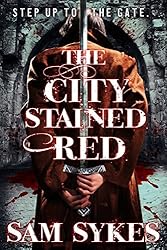
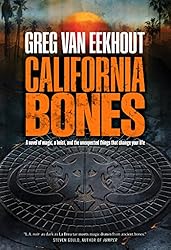
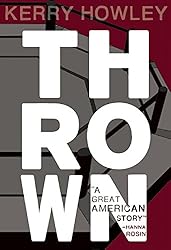
The City Stained Red by Sam Sykes (Orbit, Oct 28, 2014) begins a new series from the author of Tome of the Undergates. Kicked off by a fantastic prologue that begs to be read aloud: “Lenk and his battle-scarred companions have come to Cier’Djaal in search of Miron Evanhands, a wealthy priest who contracted them to eradicate demons — and then vanished before paying for the job.” [Audiobook coming January 27 read by David DeSantos.]
California Bones by Greg van Eekhout (Tor, Jun 10, 2014) — I’ve loved GvE’s short fiction (particularly “Carnival Park” at PodCastle) and have been eagerly anticipating his first novel for adults since his 2009 debut novel Norse Code. (In between, he’s published the fantastic middle grade novels Kid Vs. Squid and The Boy at the End of the World.) Here: “When Daniel Blackland was six, he ingested his first bone fragment, a bit of kraken spine plucked out of the sand during a visit with his demanding, brilliant, and powerful magician father, Sebastian. When Daniel was twelve, he watched Sebastian die at the hands of the Hierarch of Southern California, devoured for the heightened magic layered deep within his bones. Now, years later, Daniel is a petty thief with a forged identity. Hiding amid the crowds in Los Angeles—the capital of the Kingdom of Southern California—Daniel is trying to go straight. But his crime-boss uncle has a heist he wants Daniel to perform: break into the Hierarch’s storehouse of magical artifacts and retrieve Sebastian’s sword, an object of untold power.” Buy: [IndieBound | Kobo]. More: a Big Idea piece on Scalzi’s Whatever blog, and a sequel, Pacific Fire, is due January 27.
Thrown by Kerry Howley (Sarabande, October) — “A philosophical examination of the maligned subculture of mixed martial arts “cage” fighting.” [Kirkus] Also feature of a full-length TIME review by Lev Grossman, calling it “the most bizarre and fascinating book I’ve read this year”. Among many, many other year’s best lists, Thrown is on lists from NPR and Nick Mamatas. So there’s that.

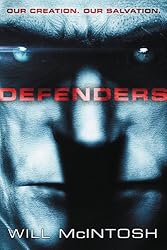

The Wilds: Stories by Julia Elliott (Tin House, September) — I first heard about this book (as so many of my favorite books, as it turns out) from Jeff VanderMeer, who has a nice Q&A with Elliott at Tin House. Then, as it turned out, a former classmate of Elliott’s brought her to town for a reading, which I enjoyed immensely. These are fantastic, fantastic stories, just all over the map. Well, mostly Southern. Levitating grandmas in possession of the Holy Spirit. Radical memory therapy in a near-future nursing home. Funny, witty, wonderful. Via Jeff VanderMeer’s year-end wrap at Electric Lit: “My favorite collection of the year.” Mine, too.
Defenders by Will McIntosh (Orbit, May) — “The invaders came to claim earth as their own, overwhelming us with superior weapons and the ability to read our minds like open books. Our only chance for survival was to engineer a new race of perfect soldiers to combat them. Seventeen feet tall, knowing and loving nothing but war, their minds closed to the aliens. But these saviors could never be our servants. And what is down cannot be undone.” — the free sample is an intense, near-future military sf read of alien invasion; I’d definitely like to hear this one, from the author of Love Minus Eighty and Soft Apocalypse. (It was also the Orbital Drop at $1.99 for the first 3 weeks after its release, and when (not if, when, darn it) this comes to audio and is Whispersync for Voice enabled, I’m going to kick myself for not picking it up on the cheap.) I’ll just quote The Guilded Earlobe: “The only reason Defenders didn’t make my top 10 Audiobooks, is because it’s not available in audio, which is a travesty. Defenders was easily my favorite print read of the year. McIntosh took pulp fiction to a new level. His economy of word created stunning imagery that defies logic.”
A Darkling Sea by James Cambias (Tor, Jan 28, 2014) — I was definitely intrigued by his Big Idea piece in which Cambias describes his debut novel as subverting the trope of Star Trek‘s Prime Directive, among other fun things, and after seeing the book on the PW best of the year list, among many other recommendations over the year, man. I’m looking forward to this. “On the planet Ilmatar, under a roof of ice a kilometer thick, a team of deep-sea diving scientists investigates the blind alien race that lives below. The Terran explorers have made an uneasy truce with the Sholen, their first extraterrestrial contact: so long as they don’t disturb the Ilmataran habitat, they’re free to conduct their missions in peace. But when Henri Kerlerec, media personality and reckless adventurer, ends up sliced open by curious Ilmatarans, tensions between Terran and Sholen erupt, leading to a diplomatic disaster that threatens to escalate to war.” [Audiobook coming February 3 from Blackstone Audio.]

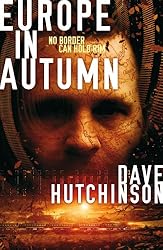

Wolves by Simon Ings (Gollancz, January) — I was blown away by the free chapters available from Gollancz for this “new novel from Simon Ings … a story that balances on the knife blade of a new technology. Augmented Reality uses computing power to overlay a digital imagined reality over the real world. Whether it be adverts or imagined buildings and imagined people with Augmented Reality the world is no longer as it appears to you, it is as it is imagined by someone else. Ings takes the satire and mordant satirical view of J.G. Ballard and propels it into the 21st century. Two friends are working at the cutting edge of this technology and when they are offered backing to take the idea and make it into the next global entertainment they realise that wolves hunt in this imagined world. And the wolves might be them.” Says Paul Kincaid: “Definitely one of the best books of the year. I reviewed it for Interzone, and reprinted the review here.” A somewhat less flattering (though still overall positive) review from Martin Lewis for Strange Horizons tempers my anticipation only a little.
Europe In Autumn by Dave Hutchinson (Solaris, January) — “a thriller of espionage and the future which reads like the love child of John le Carré and Franz Kafka. Rudi is a cook in a Kraków restaurant, but when his boss asks Rudi to help a cousin escape from the country he’s trapped in, a new career – partspy, part people-smuggler – begins.” In his review for me at bullspec.com, Paul Kincaid said: “On the surface, it’s an engaging and effective spy thriller (Hutchinson always has been a very good storyteller), but under the surface there’s something much more interesting going on. He imagines a near-future Europe Balkanized into a myriad of independent statelets, some as small as a city district or as elongated as a trans-European railway line. The reasons why the continent has disintegrated this way, and the effects of all these countless borders, make this one of the most politically astute novels I’ve read for a long time.”
The Man with the Compound Eyes: A Novel by Wu Ming-Yi (Pantheon, May) — published last year in a more limited release by Harvill Secker, a Taiwanese eco-dystopia about which Ursula Le Guin says: “We haven’t read anything like this novel. Ever. South America gave us magical realism – what is Taiwan giving us? A new way of telling our new reality, beautiful, entertaining, frightening, preposterous, true. Completely unsentimental but never brutal, Wu Ming-Yi treats human vulnerability and the world’s vulnerability with fearless tenderness.” [Kobo | Indiebound |Amazon | Kindle]


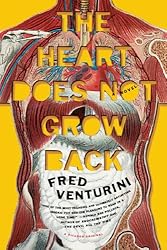
Memory of Water: A Novel by Emmi Itäranta (Harper Voyager, June) — “An amazing, award-winning speculative fiction debut novel by a major new talent, in the vein of Ursula K. Le Guin. Global warming has changed the world’s geography and its politics. Wars are waged over water, and China rules Europe, including the Scandinavian Union, which is occupied by the power state of New Qian. In this far north place, seventeen-year-old Noria Kaitio is learning to become a tea master like her father, a position that holds great responsibility and great secrets. Tea masters alone know the location of hidden water sources, including the natural spring that Noria’s father tends, which once provided water for her whole village. But secrets do not stay hidden forever, and after her father’s death the army starts watching their town—and Noria. And as water becomes even scarcer, Noria must choose between safety and striking out, between knowledge and kinship. Imaginative and engaging, lyrical and poignant, Memory of Water is an indelible novel that portrays a future that is all too possible.” Buy: [IndieBound | Kobo | Kindle]
Falling Sky by Rajan Khanna (Pyr, October) — “Ben Gold lives in dangerous times. Two generations ago, a virulent disease turned the population of most of North America into little more than beasts called Ferals. Some of those who survived took to the air, scratching out a living on airships and dirigibles soaring over the dangerous ground. Ben has his own airship, a family heirloom, and has signed up to help a group of scientists looking for a cure. But that’s not as easy as it sounds, especially with a power-hungry air city looking to raid any nearby settlements. To make matters worse, his airship, the only home he’s ever known, is stolen. Ben must try to survive on the ground while trying to get his ship back. This brings him to Gastown, a city in the air recently conquered by belligerent and expansionist pirates. When events turn deadly, Ben must decide what really matters–whether to risk it all on a desperate chance for a better future or to truly remain on his own.” [excerpt]
The Heart Does Not Grow Back by Fred Venturini (Picador, Nov. 4th) — “Dale Sampson is used to being a nonperson at his small-town Midwestern high school, picking up the scraps of his charismatic lothario of a best friend, Mack. He comforts himself with the certainty that his stellar academic record and brains will bring him the adulation that has evaded him in high school. But when an unthinkable catastrophe tears away the one girl he ever had a chance with, his life takes a bizarre turn as he discovers an inexplicable power: He can regenerate his organs and limbs.” (via My Bookish Ways)



Child of a Hidden Sea by A.M. Dellamonica (Tor, June) — via Tina Connolly at SF Signal: “What I said: “A delightful portal fantasy that feels completely fresh. I loved watching the heroine geek out over shells and sea-life to try to solve the puzzle of Stormwrack’s history. CANNOT WAIT for the sequel.” What I couldn’t fit into the blurb: This felt like it was written just for me. I loved the way Dellamonica never entirely explained Stormwrack’s history, but that there were clues that could be interpreted multiple ways. I also really liked the sister-brother relationship, which felt fresh and believable. And I’m always a fan of stories where science and fantasy bump up against each other.”
Two by Teodor Reljic (Merlin Publishers, March) — a short 144-page debut novel by the co-editor of Schlock Magazine, combining Serbian and Maltese myths in a coming-of-age novel; Greg Bossert wrote of the book: “I was lucky enough to read Teodor Reljic’s novel Two over the weekend, and if you are lucky, you will be reading it some weekend soon. Teodor absolutely nails the voice of his central character, a young boy floating in a moment: between understandings of home and nationality (the boy having just moved from the UK to malta), of his parents, of the role of story in the world. Teodor avoids all the cliches of coming-of-age stories, and steers deftly between realistic fiction, fantasy, horror, and fable. I’m not at all sure I can do justice to the book here: get it and see for yourself.”
American Neolithic by Terence Hawkins (C&R Press, May) — “America is a Police State Lite. Drones patrol the skies. The Patriot Amendments have gutted civil liberties. The Homeland Police and Patriot Tribunal have exclusive jurisdiction over all legal actions implicating national security. Enter Blingbling, the last literate member of the sole surviving band of Neanderthals, sent into the world to earn money for his people, who live in hiding on Manhattan’s Lower East Side.” This is a book I tore through while traveling to and from Montreal this summer, told in alternating chapters from the perspectives of “Raleigh”, the lawyer attempting a defense for this bizarre case under bizarre (and nearly surreal, very nearly dystopian) circumstances, and “Blingbling” himself as he recounts his personal and clan history while locked in a cell in an unknown location, some time after the events of the trial.


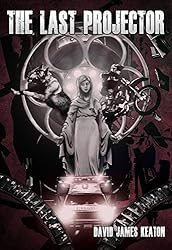
Unwrapped Sky by Rjurik Davidson (Tor, April) — “A hundred years ago, the Minotaurs saved Caeli-Amur from conquest. Now, three very different people may hold the keys to the city’s survival.Once, it is said, gods used magic to create reality, with powers that defied explanation. But the magic—or science, if one believes those who try to master the dangers of thaumaturgy—now seems more like a dream. Industrial workers for House Technis, farmers for House Arbor, and fisher folk of House Marin eke out a living and hope for a better future. But the philosopher-assassin Kata plots a betrayal that will cost the lives of godlike Minotaurs; the ambitious bureaucrat Boris Autec rises through the ranks as his private life turns to ashes; and the idealistic seditionist Maximilian hatches a mad plot to unlock the vaunted secrets of the Great Library of Caeli-Enas, drowned in the fabled city at the bottom of the sea, its strangeness visible from the skies above. In a novel of startling originality and riveting suspense, these three people, reflecting all the hopes and dreams of the ancient city, risk everything for a future that they can create only by throwing off the shackles of tradition and superstition, as their destinies collide at ground zero of a conflagration that will transform the world … or destroy it.”
Our Lady of the Islands by Shannon Page and Jay Lake (Per Aspera, December) — via Tina Connolly at SF Signal: “What I said: “A gorgeous tale of courage and friendship, with appealing characters and an epic sweep.” What I couldn’t fit into the blurb: I LOVED that this story centered on the friendship of two women (two older women at that!) Sian Katte is a awesomely capable businesswoman and grandmother, who suddenly finds herself the beneficiary of a thoroughly unwanted power. In trying to use that power for good, she ends up alongside Arian des Chances, the wife of the current ruler, whose son is quite ill. I loved watching their relationship slowly grow as they tried to maneuver the complicated intrigue and politics of the country, all while trying to save Arian’s son. Just a really lovely read.” (And also a PW year’s best list selection: via PW‘s best books of 2014: “A fantasy set in the archipelago world of Alizar, Our Lady of the Islandsfeatures the reluctant adventures of Domina Sian Katte — a middle-aged business woman who is wrenched away from her comfortable, quiet life when she is unwillingly chosen by the Priest of the Butchered God and endowed with an unwanted power. Book One of The Butchered God.” Also see Page’s Big Idea piece for Scalzi’s Whatever blog.)
The Last Projector by David James Keaton (Broken River Books, October) — “In this hysterical fever dream of a novel, meet an unhinged paramedic turned porn director uprooted from an ever-shifting ’80s fantasy. Discover a crime that circles back through time to a far-reaching cover-up in the back of an ambulance. Reveal a manic tattoo obsession and how it conspires to ruin the integrity of a story and corrupt identity itself. Unravel the mystery surrounding three generations of women and the one secret they share. And follow two amateur terrorists, whose unlikely love story rushes headlong toward a drive-in apocalypse.” Reviewed by Albedo One as “a brutal headcase of a novel” and (among other places) it showed up in The Millions year in reading columns.
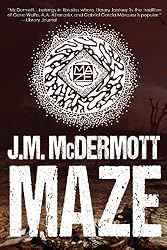

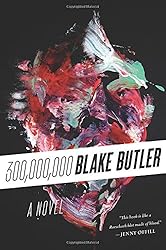
Maze by JM McDermott (Apex Book Company, January) — One of my most-anticipated fantasy novels of 2014, from the author of Last Dragon and The Dogsland Trilogy, turns out to be a science fiction / fantasy? thing? hybrid? building on his fantastic short story “Dedalus and the Labyrinth”, which, man, if you’ve seen McDermott read/perform, you can’t help but want more of where that came from. “From every corner of time and space, sometimes people go missing without a trace. They never come back. Get lost in the long stone halls of the maze with the ones that find each other, form tribes, scrape out a life from rocks and sand. Their stories interweave. Maia Station is a scientist ripped from stasis, but she has no tools to test the way things are. Instead, she raises her daughter as best she can and survives. Wang Xin once had his head dipped in water, and a djinni in the water entered his eye. He sees the future, exactly as it was supposed to be if he hadn’t seen the light, but it does him no good in the life he has. In a world much like our own, Joseph comes home from a ten year high school reunion and encounters a light in the darkness. The light speaks. My name is Jenny. Put me in your lung. Breathe deep.” Get: [IndieBound]
The Mammoth Book of SF Stories by Women edited by Alex Dally MacFarlane (Running, December) — via PW’s best books of 2014: “Written in the form of letters, travelogues, encyclopedia entries, and galactic gazetteers as well as conventional narratives, and embracing approaches that include folktales (Nalo Hopkinson’s “Tan-Tan and Dry Bone”), Lovecraftian horror (Elizabeth Bear and Sarah Monette’s “Boojum”), steampunk (Tori Truslow’s “Tomorrow Is Saint Valentine’s Day”), and hard SF (Nisi Shawl’s “Good Boy”), the 33 stories that MacFarlane (Aliens: Recent Encounters) has gathered for this volume dazzle with the virtuosity of their contributors’ talents.”
300,000,000 by Blake Butler (Harper, October) — “Blake Butler deploys words like chemicals that merge into phrases, coalescing in alternate existences, with familiar worlds distorted. In Butler’s third novel, There is No Year, a family survives a disease but is still subject to a scourge of infestations and other horrors and mysteries, including a house with secret passageways and the existence of a duplicate “copy family.” Butler began his latest novel, 300,000,000, as a retaliation against the hype surrounding Roberto Bolaño’s 2666. The result? A portrait of American violence, told through the minds of a Manson-like cult figure and the policeman responsible for figuring him out, while tracking a trail of violence and descent into psychosis.” —via The Millions. This is miles away from the remarkable Scorch Atlas which made me a Butler (and Featherproof Books) fan, but where Butler goes I can’t help but be intrigued to follow.


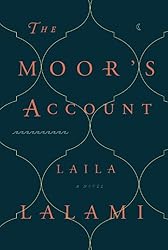
The Last Weekend by Nick Mamatas (PS Publishing, March) — “You might think that there’s nothing fresh or original in the current crop of zombie fiction, and you’d be right — unless you read The Last Weekend. Nick Mamatas crafts a clever blend of multiple genres that is equal parts heartfelt, fearful, and funny. The Last Weekend is a headshot to a tiresome trope. I loved it!” —Brian Keene.
The Last Horror Novel in the History of the World by Brian Allen Carr (Lazy Fascist, May) — from the author of Motherfucking Sharks — “Welcome to Scrape, Texas, a nowhere town near the Mexican border. Few people ever visit Scrape, and the unlucky ones who live there never seem to escape. They fill their days with fish fries, cheap beer, tobacco, firearms, and sex. But Scrape is about to be invaded by a plague of monsters unlike anything ever seen in the history of the world. First there’s La Llorona — the screaming woman in white — and her horde of ghost children. Then come the black, hairy hands. Thousands, millions, scurrying on fingers like spiders or crabs. But the hands are nothing to El Abuelo, a wicked creature with a magical bullwhip, and even El Abuelo don’t mean shit when the devil comes to town.”
The Moor’s Account: A Novel by Laila Lamami (Pantheon) — Via WSJ: “Spanish explorer Cabeza de Vaca wrote a chronicle of the disastrous 1528 Narváez expedition to the New World—out of a party of 300, only four men survived after an eight-year trek from the Gulf of Mexico to safety in Mexico City. Laila Lalami captivatingly reimagines the narrative from the point of view of a different survivor, a Moroccan slave called Estebanico. His eloquent version of events wrestles with questions of conquest and servitude while unspooling an epic tale of endurance. This novel gracefully testifies to the truth of Estebanico’s heartfelt declaration: ‘Reader, the joy of a story is in its telling.‘”


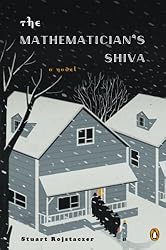
The Kills: Sutler, The Massive, The Kill, and The Hit by Richard House (Picador U.S., August) — “The Kills is an epic novel of crime and conspiracy told in four books. It begins with a man on the run and ends with a burned body. Moving across continents, characters, and genres, there will be no more ambitious or exciting novel published this year.” I first started hearing about this book via following Jeff VanderMeer’s blog, and it later showed up in his best books of the year picks for LitReactor and FSG. More recently, VanderMeer interviewed House for The Millions.
With My Dog Eyes: A Novel by Hilda Hilst and translated by Adam Morris (Melville House, April) — “Hilda Hilst (1930–2004) was one of the greatest Brazilian writers of the twentieth century, but her books have languished untranslated, in part because of their formally radical nature. This translation of With My Dog-Eyes brings a crucial work from her oeuvre into English for the first time.” Another one pulled off of VanderMeer’s LitReactor list, where he praised its “disdain for literary tradition and for middle class mores.”
The Mathematician’s Shiva: A Novel by Stuart Rojstaczer (Penguin, September) — A tragicomic novel of family, death, mathematical genius and almost-genius, academia, hunger, Eastern Europe, vodka, and more that I thoroughly enjoyed reading ahead of interviewing the author this fall: “When the greatest female mathematician in history passes away, her son, Alexander “Sasha” Karnokovitch, just wants to mourn his mother in peace. But rumor has it the notoriously eccentric Polish émigré has solved one of the most difficult problems in all of mathematics, and has spitefully taken the solution to her grave. As a ragtag group of mathematicians from around the world descends upon Rachela’s shiva, determined to find the proof or solve it for themselves—even if it means prying up the floorboards for notes or desperately scrutinizing the mutterings of her African Grey parrot—Sasha must come to terms with his mother’s outsized influence on his life. Spanning decades and continents, from a crowded living room in Madison, Wisconsin, to the windswept beach on the Barents Sea where a young Rachela had her first mathematical breakthrough, The Mathematician’s Shiva is an unexpectedly moving and uproariously funny novel that captures humanity’s drive not just to survive, but to achieve the impossible.”


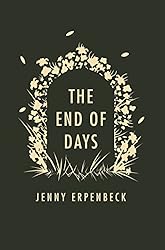
The Moon King by Neil Williamson (Newcon, April) — Debut novel: “The story of The Moon King grew out of its setting, the sea-locked city of Glassholm, which is a thinly veneered version of Glasgow, Scotland where I live. Glasgow is a city of mood swings, brilliant with sun and warm sandstone one minute and dour with overcast and rain soaked tarmac the next. Summer days are long and filled with light. The winter months pass mostly in darkness. Living here, your spirit is tied to the city’s mood. As soon as I hooked that almost bipolar sense to the idea of natural cycles, the story blossomed. In Glassholm, the moon never sets and everything, from entropy to the moods of the populace, is affected by its phasing from Full to Dark and back to Full again. I wanted to know what would life be like there, what quirks nature might throw into the mix. And what would happen if it was discovered that the cyclic euphorias and depressions were not natural after all.”
The Waking Engine by David Edison (Tor, February) — “Welcome to the City Unspoken, where Gods and Mortals come to die. Contrary to popular wisdom, death is not the end, nor is it a passage to some transcendent afterlife. Those who die merely awake as themselves on one of a million worlds, where they are fated to live until they die again, and wake up somewhere new. All are born only once, but die many times … until they come at last to the City Unspoken, where the gateway to True Death can be found.” — there’s also an excerpt up at Tor.com for this debut novel, as far as I can tell the author’s first professional publication of any kind.
The End of Days by Jenny Erpenbeck (New Directions, Nov 11) — “One of the most significant German-language novelists of her generation, Erpenbeck follows up the celebrated novel Visitation with a heady conceit located somewhere between Cloud Atlas and Groundhog Day. The End of Days follows a single character, born early in the 20th Century, to five different deaths: the first as an infant, the second as a teenager, and so on. In each case, her life illuminates the broader history of Europe, which remains ever in the background, dying its own deaths.” —via The Millions. In his most recent column for me at bullspec.com, Paul Kincaid categorizes the novel somewhere in the neighborhood of Kate Atkinson’s Life After Life and Jo Walton’s My Real Children, albeit with a “very different take”.
OK. That’s the big list. But, as usual, I did far, far too much research and link-collecting for this (surprised?) and since I have it all handy, here’s more lists:
THE NEXT TWENTY MOST MISSING SCIENCE FICTION NOVELS of 2014


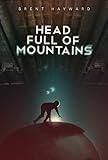

The Race by Nina Allen (NewCon, August) — “Nina Allan’s first full-length novel. Already the winner of a BSFA Award, for her novella Spin, and a Grand Prix de l’Imaginaire for the translation of The Silver Wind, there is quite a lot of expectation about this novel. Opening in a near-future, post-catastrophe Britain it nests fiction within reality, reality within fiction with an assurance that will be familiar to any readers of her shorter fiction, yet which is still designed to challenge and exhilarate the reader. As one fine review puts it: ‘Readers with a kink for understatement, alienation, and locution will be at home’. Nina Allan has promised for some time to be one of the most interesting of the new generation of British writers, and with The Race she starts to fulfil that promise.” (via Paul Kincaid)
Bathing the Lion by Jonathan Carroll (St. Martin’s Press, October) — “In Jonathan Carroll’s surreal masterpiece, Bathing the Lion, five people who live in the same New England town go to sleep one night and all share the same hyper-realistic dream. Some of these people know each other; some don’t. When they wake the next day all of them know what has happened. All five were at one time “mechanics,” a kind of cosmic repairman whose job is to keep order in the universe and clean up the messes made both by sentient beings and the utterly fearsome yet inevitable Chaos that periodically rolls through, wreaking mayhem wherever it touches down.” [IndieBound]
Head Full of Mountains by Brent Hayward (ChiZine, August 8, 2014) — “When Crospinal’s ailing father dies, he is left utterly alone in the pen, surrounded by encroaching darkness. The machines that tended to him as a child have long ago vanished, and the apparitions that kept Crospinal company are now silenced. Struggling with his congenital issues, outfitted in a threadbare uniform, he has little choice but to leave what was once his home, soon discovering that nothing in the outside world is how he had been told it would be. In his quest for meaning and understanding, and the contact of another, Crospinal learns truths about himself, about his father, and about the last bastion of humanity, trapped with him at the end of time.” — The Star. And one of my favorite new fantasists, Zachary Jernigan, calls it “a dark, dangerously compelling work from one of the most impressive wordsmiths in science fiction.”
Bête by Adam Roberts (Orion/Gollancz UK, September) — a “near future SF novel about animals rights and artificial intelligence” (via Locus Online) which Paul Kincaid calls “a black comedy that is being compared to H.G. Wells’s The Island of Doctor Moreau and George Orwell’s Animal Farm in considering the philosophical implications of our relationship with animals and whether speech and self-awareness equates with a soul. Though to my mind a more apposite comparison might be to the scene at the Restaurant at the End of the Universe in Douglas Adams’s The Hitchhiker’s Guide to the Galaxy.”
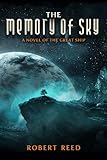
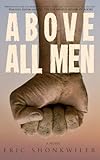


The Memory of Sky: A Great Ship Trilogy by Robert Reed (Prime Books, March) — “Diamond is an odd little boy, a seemingly fragile child – who proves to be anything but. An epic story begins when he steps into the world his parents have so carefully kept him from, a world where gigantic trees each house thousands of humans and another human species, the papio, rule its far edges. Does Diamond hold the promise to remake one species and, perhaps, change all of the Creation?”
Above All Men by Eric Shonkwiler (MG Press, January) — via The Spark and the LA Review of Books, among other places I saw this book on year’s best lists: “Years from now, America is slowly collapsing. Crops are drying up and oil is running out. People flee cities for the countryside, worsening the drought and opening the land to crime. Amid this decay and strife, war veteran David Parrish fights to keep his family and farm together. However, the murder of a local child opens old wounds, forcing him to confront his own nature on a hunt through dust storms and crumbling towns for the killer.”
Empire of Dust: A Psi-Tech Novel by Jacey Bedford (DAW, November) — “Mega corporations, more powerful than any one planetary government, use their agents to race each other for resources across the galaxy. The agents, or psi-techs, are implanted with telepath technology. The psi-techs are bound to the mega-corps — that is, if they want to retain their sanity.”
The Burning Dark by Adam Christopher (Tor, Mar 25, 2014) — “Adam Christopher’s dazzling first novel, Empire State, was named the Best Book of 2012 by SciFi Now magazine. Now he explores new dimensions of time and space in The Burning Dark. Back in the day, Captain Abraham Idaho Cleveland had led the Fleet into battle against an implacable machine intelligence capable of devouring entire worlds. But after saving a planet, and getting a bum robot knee in the process, he finds himself relegated to one of the most remote backwaters in Fleetspace to oversee the decommissioning of a semi-deserted space station well past its use-by date. But all is not well aboard the U-Star Coast City.” See his Big Idea post for more including links to excerpts. More recently, the novel has been named to the preliminary Bram Stoker Award ballot.




Asura Girl by Otaro Maijo and translated by Stephen Snyder (Haikasoru, November) — “Seventeen-year-old Aiko lives a life of casual sex and casual violence, though at heart she remains a schoolgirl with an unrequited crush on her old classmate Yoji Kaneda. Life is about to get harder for Aiko, as a recent fling, Sano, has been kidnapped, and the serial killer Guru-Guri Majin (Round-and-Round Devil) has begun slaughtering children. The youth are rioting in the streets, egged on by the underground Internet bulletin board known as Ten-no Koe, the Voice from Heaven. Expecting that Yoji will come and save her from the madness, Aiko posts a demand for her own murder on Ten-no-Koe, but will she be left waiting…or worse?”
Jade Sky by Patrick Freivald (JournalStone, May) — via K.H. Vaughan on a SF Signal Mind Meld of “books we can’t wait to read in 2014″ — “Matt Rowley hasn’t been human for years. A commando for the International Council on Augmented Phenomena, he hunts down superhuman monsters the military can’t handle. But his abilities come with a price: bloodthirsty whispers that urge him to acts of terrible violence. An encounter with a giant, angelic being with wings of smoke and shadow casts him into a world of inhuman brutality, demonic possession, and madness, where he must choose between his family and his soul.”
The Blood of Angels by Johanna Sinisalo, translated from Finnish by Lola Rogers (Peter Owen Publishers, October) — “Another haunting novel of eco-speculation from Johanna Sinisalo, the award-winning author of Troll and a powerhouse of the Finnish science fiction and fantasy scene. It is claimed Albert Einstein said that if bees disappear from the earth, mankind has four years left. When bee-vanishings of unprecedented scale hit the United States, Orvo, a Finnish beekeeper, knows all too well where it will lead. And when he sees the queen dead in his hives one day, it’s clear the epidemic has spread to Europe, and the world is coming to an end. Orvo’s special knowledge of bees just may enable him to glimpse a solution to catastrophe: he takes a desperate step onto a path where only he and the bees know the way but it propels him into conflict with his estranged, but much-loved son, a committed animal activist. A magical plunge into the myth of death and immortality, this is a tale of human blindness in the face of devastation—and the inevitable.”
Blackout by Tim Curran (DarkFuse, August) — “In the midst of a beautiful summer, in a perfectly American suburban middle-class neighborhood, a faraway evil is lurking, waiting to strike the unsuspecting residents. First come the flashing lights, then the heavy rains, high winds, and finally a total blackout. But that’s only the beginning… When the whipping black tentacles fall from the sky and begin snatching people at random, the denizens of Piccamore Way must discover the terrifying truth of what these beings have planned for the human race.” (Hat tip to The Examiner’s Josef Hernandez.)




Wasteland Blues by Scott Christian Carr and Andrew Conry-Murray (Raw Dog Screaming Press/Dog Star Books, March) — “Having only ever known the uncivilized wake of nuclear and biological apocalypse, three friends-and their wheelchair-bound hostage-set out on a perilous fool’s mission: to cross from one side of the devastated United States to the other, in the desperate, half-believed hope of finding a rumored haven. Spurred by a dark vision and the murder of their parents, rageaholic Derek Cane and his oversized, simple-minded brother Teddy flee the only home they’ve ever known, a struggling shantytown on the edge of the vast wasteland. Heading ever eastward, they are accompanied by their friend John, an orphan brought up by a fanatical religious order, and Leggy, a crippled old drunk who brags that, in his youth, he once traversed the wasteland as a scavenger. Wasteland Blues is the first book of a post-apocalypse Trilogy.”
Severance by Chris Bucholz (Apex Books, Dec 9) — a dark SF novel from Cracked.com columnist Bucholz — “After 240 years traveling toward Tau Prius and a new planet to colonize, the inhabitants of the generation ship Argos are bored and aimless. They join groups such as the Markers and the Breeders, have costumed orgies, and test the limits of drugs, alcohol, and pain just to pass the time. To Laura Stein, they’re morons and, other than a small handful of friends, she’d rather spend time with her meat plant than with any of her fellow passengers. But when one of her subordinates is murdered while out on a job, Laura takes it as her responsibility to find out what happened. She expects to find a personal grudge or a drug deal gone wrong, but instead stumbles upon a conspiracy that could tear the ship in two.”
The Country of Ice Cream Star by Sandra Newman (Chatto & Windus, June) — UK release, with Canada release coming in July and US release not until February 2015 from Ecco: “In the ruins of a future America, fifteen-year-old Ice Cream Star and her people survive by scavenging in the detritus of an abandoned civilization. Theirs is a world of children – by the time they reach twenty, each of them will die from a disease they call posies. When her brother sickens, Ice Cream sets out on the trail of a cure, led by a stranger whose intentions remain unclear. It’s a quest that will lead her to love and heartbreak, to captivity and to a nation’s throne, and ultimately into a war that threatens to doom everyone she loves.”
The Madonna and the Starship by James Morrow (Tachyon, June) — “In this satirical novel set in the 1950s, a group of skeptical alien crustaceans invade NBC studios, threatening to vaporize millions of “irrational” fans of a religious TV show. It’s up to the Bill Nye-esque science TV personality “Uncle Wonder” to write a script that’s so rationally absurd that the aliens will be deterred in their deadly mission.” (via io9.com). There’s an interview on “large philosophical questions” at SFSignal and a highly-positive review at Locus Online as well. Buy: [IndieBound| Kobo | Amazon]

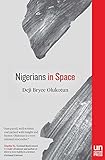
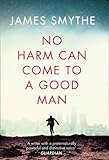

All Those Vanished Engines by Paul Park (Tor, July) — “Park returns to science fiction after a decade spent on the impressive four-volume A Princess of Roumania fantasy, with an extraordinary, intense, compressed SF novel in three parts, each set in its own alternate-history universe. The sections are all rooted in Virginia and the Battle of the Crater, and are also grounded in the real history of the Park family, from differing points of view. The first section is set in the aftermath of the Civil War, in a world in which the Queen of the North has negotiated a two-nation settlement. The second, taking place in northwestern Massachusetts, investigates a secret project during World War II, in a time somewhat like the present. The third is set in the near-future United States, with aliens from history.” [IndieBound]
Nigerians in Space by Deji Olukoton (The Unnamed Press, January) — Among several other mentions, via Tor.com’s Jared Shurin, Strange Horizon’s Aishwarya Subramanian, and Adam Morgan: “With a title like “Nigerians in Space”, do you really need any other reasons to read this thing? Fine. In mid-90’s Houston, Dr. Wale Olufunmi is tasked with stealing a piece of the moon from the United States and returning it to Nigeria. In addition to being a slick, weird little SF/espionage thriller, the novel also gives you an authentic taste of life in both Nigeria and South Africa, from the 90’s to the present-day.”
No Harm Can Come to a Good Man by James Smythe (The Borough Press, May) — “How far would you go to save your family from an invisible threat? A terrifyingly original thriller from the author of The Machine. ClearVista is used by everyone and can predict anything. It’s a daily lifesaver, predicting weather to traffic to who you should befriend. Laurence Walker wants to be the next President of the United States. ClearVista will predict his chances. It will predict whether he’s the right man for the job. It will predict that his son can only survive for 102 seconds underwater. It will predict that Laurence’s life is about to collapse in the most unimaginable way.” It’s completely fitting that Anne Charnock was tapped to review the book for Strange Horizons, as her own A Calculated Life shares themes of predictive futurism; it’s not fitting at all that we have none, zero, zilch, nada of Smythe’s sf novels in audio, as The Testimony, The Machine, The Explorer, and The Echo all are also on my “most missing” list.
Peacemaker by Marianne De Pierres (Angry Robot, April) — “Virgin Jackson is the senior ranger in Birrimun Park - the world’s last natural landscape, overshadowed though it is by a sprawling coastal megacity. She maintains public safety and order in the park, but her bosses have brought out a hotshot cowboy to help her catch some drug runners who are affecting tourism. She senses the company is holding something back from her, and she’s not keen on working with an outsider like Nate Sixkiller.”
Honorable mentions: Gemsigns by Stephanie Saulter (via Bibliosanctum); Heaven’s Queen (Paradox) by Rachel Bach; Soda Pop Soldier: A Novel by Nick Cole (Harper Voyager); Seeders: A Novel by A. J. Colucci (Thomas Dunne); One Three One by Julian Cope; Morningside Fall (Duskwalker Cycle Book 2) by Jay Posey (Angry Robot, and Luke Daniels is narrating this one, with the audiobook due out soon); Definitely Maybe (Neversink) by Arkady and Boris Strugatsky (Melville House, a new “unexpurgated” edition of this classic work of Russian sf); That Roswell: An Alien Looks Back by John Camp (Outskirts Press, with a heckuva review by World Fantasy Award winner Lewis Shiner); Resistance by Samit Basu (Titan, follow-on to Turbulence); The Forever Man: A Near-Future Thriller by Pierre Ouellette (Random House/Alibi); Fear the Sky (The Fear Saga Book 1) by Stephen Moss; A Girl Called Fearless: A Novel by Catherine Linka (St. Martin’s Griffin; The Time Roads by Beth Bernobich; The Collapse of Western Civilization: A View from the Future by Naomi Oreskes and Erik M. Conway (Columbia University, via Locus Online); The Savior (The General) by Tony Daniel and David Drake (Baen, sequel to The Heretic); The Silent History by Eli Horowitz, Matthew Derby, and Kevin Moffett (audiobook release scheduled for January 20); Cataveiro by E.J. Swift (The Osiris Trilogy, Book 2); The Monster’s Wife by Horsley Kate (Barbican Press); Dark Lightning by John Varley (Ace); The Long Way to a Small, Angry Planet by Becky Chambers (via Tor.com’s Reviewers Choice); World of Fire by James Lovegrove (Solaris); Flight of the Golden Harpy by Susan Klaus (Tor Books); The Ultra Thin Man by Patrick Swenson (Tor); Lowball: A Wild Cards Novel edited by George R.R. Martin (Tor, November, the 22nd Wild Cards book!); Descent by Ken MacLeod (Orbit, March); The Echo (The Anomaly Quartet) by James Smythe (Harper Voyager, January, sequel to The Explorer); and Cycling to Asylum by Su J. Sokol (Deux Voiliers Publishing, May, via K. Tempest Bradford)
THE NEXT TWENTY MOST MISSING FANTASY NOVELS of 2014




Full Fathom Five: A Novel of the Craft Sequence by Max Gladstone (Tor, July) — the third in Gladstone’s fantastic secondary world fantasy The Craft Sequence series after Three Parts Dead and Two Serpents Rise (which are both in audio from Blackstone); a sample is available at Tor.com as well as a very positive review from Liz Bourke. I loved the first book in this series: a fantasy legal thriller? Well, it was something like that, with a badass heroine to boot. Gladstone continues to dot around his deeply fascinating and original world of gods and magical contracts. [Kobo]
The Mercury Waltz by Kathe Koja (Roadswell Editions, January) — sequel to Koja’s beautiful Under the Poppy, reviewed by Lewis Shiner as: “The Mercury Waltz returns us to the grimy, decadent, fin-de-siècle world of Under the Poppy, cranking the resolution to reveal every brilliantly imagined nook of one corner of this world, in prose that is exquisite, sensual, evocative, romantic, and luxurious. There is no one left to compare Koja to–I don’t know another writer with her fearlessness, erudition, and perfect pitch. The effect is dazzling.”Cory Doctorow’s Boing Boing shared the book trailer last summer but it wasn’t until Koja’s “Big Idea” essay on Scalzi’s Whatever blog that I knew this was actually coming this year, or indeed finally out.
Swords of Good Men by Snorri Kristjansson (Jo Fletcher Books, January) — a “Viking fantasy novel” by a new Icelandic author published in the UK in 2013: “To weary Viking Ulfar Thormodsson, the town of Stenvik is the penultimate stop on the return leg of a long and perilous journey. It has been particularly challenging for Thormodsson, who has been charged with protecting the life of his high-born cousin. Having traveled the oceans of the world for two years, all he wants is to go home. But Stenvik awaits.” [IndieBound] Sequel Blood Will Follow by Snorri Kristjansson (Jo Fletcher Books, June) came out in the UK last year as well, and was just published in the US last week.
Invisible Beasts by Sharona Muir (Bellevue Literary, July) — Fantasy novel, the author’s first novel, subtitled “Tales of the Animals that Go Unseen Among Us”, about an amateur naturalist who compiles a bestiary of the invisible, sentient creatures she can perceive.” —via Locus Online. PW’s starred review called it “an amazing feat of imagination” and among other laurels it was also named a Library Journal “Top Indie Fiction” selection. [Kobo]




A Country of Ghosts by Margaret Killjoy (Combustion Books, March) — “Dimos Horacki is a Borolian journalist and a cynical patriot, his muckraking days behind him. But when his newspaper ships him to the front, he’s embedded in the Imperial Army and the reality of colonial expansion is laid bare before him. His adventures take him from villages and homesteads to the great refugee city of Hronople, built of glass, steel, and stone, all the while a war rages around him. The empire fights for coal and iron, but the anarchists of Hron fight for their way of life. From the editor of Mythmakers & Lawbreakers: Anarchist Writers on Fiction and author of What Lies Beneath the Clock Tower comes a seditious novel of utopia besieged, a novel that challenges every premise of contemporary society.” Called “an exciting and mysterious novel, a story of war and love” by Kim Stanley Robinson, author of the Mars trilogy and “a fierce, intelligent, hopeful book—a fantasy (of sorts) of unusual seriousness, humanity, and wit.” by Felix Gilman, author of The Half-Made World, and a book I enjoyed reading, page after page, after (instead of the more helpful before) interviewing Killjoy this spring.
Son of the Morning by Mark Alder (Gollancz, April) — “Edward the Third stands in the burnt ruin of an English church. He is beset on all sides. He needs a victory against the French to rescue his Kingship. Or he will die trying. Philip of Valois can put 50,000 men in the field. He has sent his priests to summon the very Angels themselves to fight for France. Edward could call on God for aid but he is an usurper. What if God truly is on the side of the French? But for a price, Edward could open the gates of Hell and take an unholy war to France …Mark Alder has brought the epic fantasy of George R.R. Martin to the vivid historical adventure of Bernard Cornwell and has a created a fantasy that will sweep you to a new vision of the Hundred Years War.” A UK-only release (so far?) of “a smart, gripping historical fantasy” (SFX) which Adam Roberts tapped as “genuinely marvellous … my Fantasy novel of the year” at Strange Horizons.
The Child Eater by Rachel Pollack (Jo Fletcher Books, July) — “On Earth, the Wisdom family has always striven to be more normal than normal. But Simon Wisdom, the youngest child, is far from normal: he can see the souls of the dead. And now the ghosts of children are begging him to help them, as they face something worse than death. The only problem is, he doesn’t know how. In a far-away land of magic and legends, Matyas has dragged himself up from the gutter and inveigled his way into the Wizards’ college. In time, he will become more powerful than all of them – but will his quest blind him to the needs of others? For Matyas can also hear the children crying. But neither can save the children alone, for the child eater is preying on two worlds…” So far a UK-only release, coming to the US in July.
Smiler’s Fair by Rebecca Levene (Hodder & Stoughton, July) — Book 1 of The Hollow Gods: “Yron the moon god died, but now he’s reborn in the false king’s son. His human father wanted to kill him, but his mother sacrificed her life to save him. He’ll return one day to claim his birthright. He’ll change your life. He’ll change everything. Smiler’s Fair: the great moving carnival where any pleasure can be had, if you’re willing to pay the price. They say all paths cross at Smiler’s Fair. They say it’ll change your life. For five people, Smiler’s Fair will change everything. In a land where unimaginable horror lurks in the shadows, where the very sun and moon are at war…” (Via BuzzFeed, and also reminded by Tor.com’s year in review roundups.)

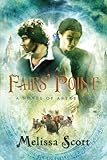
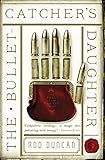

Traitor’s Blade by Sebastien de Castell (Jo Fletcher Books, July 1) — “In the first of a new fantasy series by Sebastien de Castell, a disgraced swordsman struggles to redeem himself by protecting a young girl caught in the web of a royal conspiracy. Falcio is the first Cantor of the Greatcoats. Trained in the fighting arts and the laws of Tristia, the Greatcoats are travelling Magisters upholding King’s Law. They are heroes. Or at least they were, until they stood aside while the Dukes took the kingdom, and impaled their king’s head on a spike.”
Fairs’ Point: A Novel of Astreiant by Melissa Scott (Lethe Press, May) — “During Dog Moon, the chief entertainment in the great city of Astreiant, for nobles and commons alike, is the basket-terrier races at New Fair. This year, with spectacularly bad timing, the massive and suspicious bankruptcy of a young nobleman has convulsed the city, leading to suicides, widespread loss of employment, and inconvenient new laws around the universal practice of betting on the races. As well, a rash of mysterious burglaries seems to suggest a magistical conspiracy. Pointsman Nicolas Rathe is naturally in the midst of all these disturbances—as is his lover, foreign former mercenary Philip Eslingen.” The long, long-awaited fourth book in the Astreiant series; Point of Knives: A Novella of Astreiant, Book 1.5 and Point of Dreams: A Novel of Astreiant: Astreiant, Book 2 are both recently in audio, a medium in which Lethe is increasingly active, so my money’s on this title eventually coming to audio.
The Bullet-Catcher’s Daughter by Rod Duncan (Angry Robot, August) — Book one of a new duology The Fall of the Gas-Lit Empire: “Elizabeth Barnabus lives a double life – as herself and as her brother, the private detective. She is trying to solve the mystery of a disappearing aristocrat and a hoard of arcane machines. In her way stand the rogues, freaks and self-proclaimed alchemists of a travelling circus.”
The Last Superhero by Astrid ‘Artistikem’ Cruz (Artistikem, December) — “Even heroes have the right to bleed… Everybody knows that Steven S. Waldorf, the last superhero to roam the Earth, died twenty-eight years ago. What everyone ignores is that not only is he still alive, but being kept under the protection of the United State’s government. That until, one night, he finds himself saving a young woman from getting mugged. Giana is no ordinary twenty-nine year old, though. She’s witty, badmouthed, and once she’s set her focus on something nothing can make her stray from her goal. Even if that means putting her life on the line to save the man she’s come to know and love from the nightmares that torment him. Literally.”


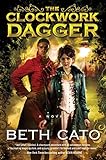

Deadly Curiosities by Gail Z. Martin (Solaris, June) — Beginning a new urban fantasy series: “Cassidy Kincaide owns Trifles & Folly, an antique/curio store and high-end pawn shop in Charleston, South Carolina that is more than what it seems. Dangerous magical and supernatural items sometimes find their way into mortal hands or onto the market, and Cassidy is part of a shadowy Alliance of mortals and mages whose job it is to take those deadly curiosities out of circulation.”
The 13 Secret Cities: A Novel in Four Parts by Cesar Torres (Solar Six Books, April) — the first installment of a contemporary Mexican-American fantasy: “Clara Montes has a single goal in life: to achieve social justice. Within days of starting her freshman year in college, Clara Montes joins the Occupy Liberation front, a controversial political group that has planned a gathering of thousands in Chicago’s Millennium Park on a chilly Friday afternoon. Nothing will stop her from attending. When the protest turns into a riot, Clara is swept into a horror that will change the course of American history forever. As a result, Clara’s parents forbid her to return to the OLF. They warn Clara that she has developed a thirst for chaos and violence that goes against every tradition her family brought with them from Mexico. Clara will need to atone for her transgressions by traveling to the mythical city of Mictlán, the realm of dead spirits. During the journey, she will face the Lords of the Dead, two ancient gods who will show no mercy, and who thrive on the taste of human blood.”
The Clockwork Dagger by Beth Cato (Harper Voyager, September) — via Tina Connolly at SF Signal: “What I said: “Airships, assassins, pulp writers, and an independent, appealing heroine: The Clockwork Dagger is an exciting debut full of mysterious magic, forbidden romance, and adventure at 5,000 feet.” What I couldn’t fit into the blurb: I particularly loved the sidekick character of Mrs. Stout, the above-mentioned pulp writer. She was quirky and very fun as a career woman with plenty of opinions and plans.”
Three Princes by Ramona Wheeler (Tor, February) — I’m drawn in by the premise, the fantastic cover art, and the excerpt at Tor.com. “Lord Scott Oken, a prince of Albion, and Professor-Prince Mikel Mabruke live in a world where the sun never set on the Egyptian Empire. In the year 1877 of Our Lord Julius Caesar, Pharaoh Djoser-George governs a sprawling realm that spans Europe, Africa, and much of Asia. When the European terrorist Otto von Bismarck touches off an international conspiracy, Scott and Mik are charged with exposing the plot against the Empire.”


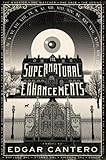

Blood Kin by Steve Rasnic Tem (Solaris, February) — “Steve Rasnic Tem’s new novel Blood Kin is set in the southern Appalachians of the U.S., alternating between the 1930s and the present day. It’s a dark Southern Gothic vision of ghosts, witchcraft, secret powers, snake-handling, Kudzu, Melungeons, and the Great Depression.” [IndieBound]
The Stone Boatmen by Sarah Tolmie (Aqueduct, April) — Quoth Ursula K. Le Guin: “Certain imaginative novels never best-sell, yet remain alive, a singular treasure to each new generation that finds them — books such as Islandia, The Worm Ouroboros, Gormenghast. The Stone Boatmen has the makings of one of these quiet classics. It is lucid yet complex. Its strangeness fascinates, captivates. To read it is to find yourself in a country a long, long way from home, taken on a unforeseeable journey — and when it’s over, you wish you were still there. ”
The Supernatural Enhancements by Edgar Cantero (Doubleday, August) — Via Adam Morgan: “If Neil Gaiman designed a MYST age, it would probably resemble the labyrinthine mansion in Cantero’s rollicking epistolary, neo-gothic novel. When a European man known only as “A.” inherits a long-lost relative’s estate in the Virginia countryside, he discovers that the previous two owners committed suicide in the exact same way, decades apart. There’s also a mysterious gathering of distinguished gentlemen at the house every winter solstice, a litany of secret passageways, coded letters, and hidden knowledge. Puzzles abound, both physical and narrative, and the mute teenage girl named Niamh–the Watson to A.’s Sherlock–steals the show.”
Bad Wizard by James Maxey (Antimatter Press, October) — a fantastic parallel novel to The Wonderful Wizard of Oz as investigative journalist Dorothy Gale tries to stop U.S. Secretary of War Oscar Zoroaster Diggs from returning to Oz at the head of a zeppelin armada: “In 1892, Oscar Zoroaster Diggs turned up in Topeka with a suitcase full of high quality emeralds. Instantly the richest man in Kansas, his winning smile and keen mind launched him into a meteoric political career. As Secretary of War under Teddy Roosevelt, Diggs oversees the construction of the ultimate tool for spreading democracy, a fleet of rigid airships. Dorothy Gale, a reporter for the Kansas Ear, is the one person who knows the truth about Diggs. She met him ten years prior in the Emerald City, where he ruled as the Wizard. But how can she explain to her editor that Diggs intends to use his aerial navy to invade an island in the clouds ruled by witches? Stopping Diggs is going to take more than the power of the press. She’ll need the help of old friends, and maybe a Winged Monkey, as she pursues the Wizard across the wondrous and deadly Land of Oz.”
Honorable mentions: We Leave Together (Dogsland #3) by J.M. McDermott (Word Horde, the eagerly-awaited conclusion to McDermott’s dark fantasy Dogsland trilogy); Dreams of the Golden Age by Carrie Vaughn (Tor, follow-on to After the Golden Age); The Gifted Dead by Jenna Black (a new contemporary fantasy that Lilith Saintcrow calls “House of Cards meets Game of Thrones”); Talus and the Frozen King by Graham Edwards (Solaris, “In a distant time long before our own, wandering bard Talus and his companion Bran journey to the island realm of Creyak, where the king has been murdered.”); The Shotgun Arcana by R.S. Belcher (Tor, follow-on to the Weird Western The Six-Gun Tarot); The Lost by Sarah Beth Durst (Harlequin Mira); The Seventh Miss Hatfield by Anna Caltabiano (Gollancz, debut novel from 17-year-old author); Straggletaggle by J.M. McDermott; The Seventh Bride by T. Kingfisher; Finders, Inc. by Michael Jasper; Valor (The Faithful and the Fallen) by John Gwynne (Orbit, book one, Malice, was read by John Keating for Recorded Books); Stolen Crown: A Novel of Mithgar by Dennis L. McKiernan (Roc); Night Terrors by Tim Waggoner (Angry Robot); The Seat of Magic: A Novel of the Golden City by J. Kathleen Cheney (Roc, second in a series following The Golden City); The Blasted Lands (Seven Forges, Book 2) by James A. Moore (Osprey); Sword of the North (The Grim Company, Book 2) by Luke Scull (Roc Hardcover); The Severed Streets by Paul Cornell (book one of this London-set dark urban fantasy, London Falling, was narrated by Damian Lynch); Yesterday’s Hero by Jonathan Wood (Titan, urban fantasy follow-on to No Hero); Age of Shiva by James Lovegrove (Solaris); Fortune’s Favors (Nyx Fortuna) by Marlene Perez (Orbit, concluding this urban fantas trilogy); The Copper Promise by Jen Williams (Headline Books, via The BiblioSanctum); Sworn in Steel: A Tale of the Kin by Douglas Hulick (follow-on to Among Thieves; The Silk Map: A Gaunt and Bone Novel by Chris Willrich (Pyr, second in a series following The Scroll of Years); Beautiful Blood by Lucius Shepard (Subterranean Press, posthumous publication of Shepard’s fantasy novel concluding his Dragon Griaule cycle); Arcanum by Simon Morden (Orbit); The End of the Sentence by Maria Dahvana Headly and Kat Howard (Subterranean Press, one of NPR’s best books of 2014); The Weirdness: A Novel by Jeremy P. Bushnell (Melville House); Grudgebearer by J.F. Lewis (Pyr, beginning a new epic fantasy trilogy); American Craftsmen by Tom Doyle (Tor, debut novel: “In modern America, two soldiers will fight their way through the magical legacies of Poe and Hawthorne to destroy an undying evil”); The Chronicle of Secret Riven: Keeper of Tales Trilogy: Book Two by Ronlyn Dominique (Atria); The Book of the Crowman (Black Dawn) by Joseph D’Lacey (Angry Robot); Strange Country by Deborah Coates (Tor Books, third in a series about a psychic Afghanistan vet who’s returned home to face supernatural threats in her South Dakota hometown); Skin of the Wolf by Sam Cabot (Blue Rider Press); Sword of the Bright Lady (WORLD OF PRIME) by M.C. Planck (Pyr, editor Lou Anders calls it “a great flintlock fantasy with a Mark Twain angle”); A Play of Shadow: Night’s Edge: Book Two by Julie Czerneda (DAW); The Flesh Sutra by Tim W. Burke (NobleFusion); This Darkness Light by Michaelbrent Collings; The Braided Path by Donna Glee Williams (EDGE Science Fiction and Fantasy); Bad Magic by Stephen Zielinski (Tor Books); and The Lascar’s Dagger by Glenda Larke (Orbit, audiobook edition released January 6)
THE NEXT TWENTY MOST MISSING LITERARY AND CRIME FICTION NOVELS of 2014


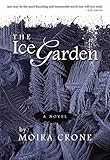
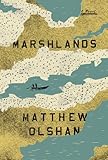
The Wake by Paul Kingsnorth (Unbound, April) — Written in a “shadow language” of moderately more legible and comprehensible Old English, the story of the aftermath of The Battle of Hastings and the start of the Norman invasion and occupation of England, “The Wake tells the story of a fractured band of guerilla fighters who take up arms against the invaders.” Reviewed as “a literary triumph” by The Guardian.
The Wallcreeper by Nell Zink (Dorothy Project, October) — Another one via Jeff VanderMeer’s LitReactor column, and also Fiction Advocate among other year-end mentions: “A manic, heartfelt, intellectual novel about an American couple living in Europe,The Wallcreeper is one of the best books of the year. Tiff and Stephen cheat on each other constantly, they’re horrible to each other, and they don’t seem to believe in their own marriage. But they both love birds—like the wallcreeper that they adopt together, after they hit it with a car, which causes Tiff to miscarry. It’s hard to think of two fictional characters who are more believably fucked up, or more exquisitely codependent, or more maddening and joyful to know.”
The Ice Garden by Moira Crone (Carolina Wren Press, October) — “Ten-year-old Claire adores her brand-new baby sister, but her mother doesn’t feel the same. Trapped in the suffocating culture of the small-town South in the early 1960s, Claire’s mother tries to cope with her own mental illness and all the expectations placed upon a woman of her class. While Claire’s father remains too dazzled by his beautiful wife to recognize the impending dangers, Claire is left largely on her own to save herself and her baby sister–with mesmerizing and shocking consequences.”
Marshlands by Matthew Olshan (FSG, February) — “After years alone in a cell, an aging prisoner is released without explanation, expelled into a great city now utterly unfamiliar to him. Broken by years of brutality at the hands of the prison guards, he scrounges for scraps, sleeping wild, until a museum curator rescues him from an assault. The museum has just opened its most controversial exhibit: a perfect replica of the marshes, an expansive wilderness still wracked by conflict. There the man had spent years as a doctor among the hated and feared marshmen, who have been colonized but never conquered.”


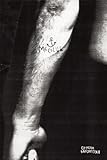

Nobody Is Ever Missing: A Novel by Catherine Lacey (FSG Originals, July) — “Without telling her family, Elyria takes a one-way flight to New Zealand, abruptly leaving her stable but unfulfilling life in Manhattan. As her husband scrambles to figure out what happened to her, Elyria hurtles into the unknown, testing fate by hitchhiking, tacitly being swept into the lives of strangers, and sleeping in fields, forests, and public parks. Her risky and often surreal encounters with the people and wildlife of New Zealand propel Elyria deeper into her deteriorating mind. Haunted by her sister’s death and consumed by an inner violence, her growing rage remains so expertly concealed that those who meet her sense nothing unwell. This discord between her inner and outer reality leads her to another obsession: If her truest self is invisible and unknowable to others, is she even alive? The risks Elyria takes on her journey are paralleled by the risks Catherine Lacey takes on the page. In urgent, spiraling prose she whittles away at the rage within Elyria and exposes the very real, very knowable anxiety of the human condition. And yet somehow Lacey manages to poke fun at her unrelenting self-consciousness, her high-stakes search for the dark heart of the self.”
The Absolution of Roberto Acestes Laing by Nicholas Rombes (Two Dollar Radio, November) — “In the mid-’90s a rare-film librarian at a state university in Pennsylvania mysteriously burned his entire stockpile of film canisters and disappeared. Roberto Acestes Laing was highly regarded by acclaimed directors around the globe for his keen eye, appreciation for eccentricity, and creativity in interpretation. Unsure at first whether Laing is a pseudonym or some sort of Hollywood boogeyman, a journalist manages to track the forgotten man down to a motel on the fringe of the Wisconsin wilds. Laing agrees to speak with the journalist, but only through the lens of the cinema. What ensues is an atmospheric, cryptic extrapolation of movies and how they intertwine with life, and the forgotten films that curse the lost librarian still.”
McGlue by Ottessa Moshfegh (Fence Books, November) — Winner of the Fence Modern Prize in Prose: “Salem, Massachusetts, 1851: McGlue is in the hold, still too drunk to be sure of name or situation or orientation—he may have killed a man. That man may have been his best friend. Intolerable memory accompanies sobriety. A-sail on the high seas of literary tradition, Ottessa Moshfegh gives us a nasty heartless blackguard on a knife-sharp voyage through the fogs of recollection.”
A Brave Man Seven Storeys Tall: A Novel by Will Chancellor (Harper, July) — “A beautiful and compulsively readable literary debut that introduces Owen Burr—an Olympian whose dreams of greatness are dashed and then transformed by an epic journey—and his father, Professor Joseph Burr, who must travel the world to find his son. After his athletic career ends abruptly, Owen flees the country to become an artist. He lands in Berlin where he meets a group of art monsters living in the Teutonic equivalent of Warhol’s Factory. After his son’s abrupt disappearance, Burr dusts off his more speculative ideas in a last-ditch effort to command both Owen’s and the world’s attention. A Brave Man Seven Storeys Tall offers a persuasive vision of faith, ambition, art, family, and the myths we write for ourselves.”


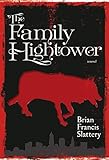

A Girl Is a Half-formed Thing by Eimear McBride (Coffee House Press, August) — Winner of too many awards on on too many year’s best lists to list: “Eimear McBride’s debut tells, with astonishing insight and in brutal detail, the story of a young woman’s relationship with her brother, and the long shadow cast by his childhood brain tumour. Not so much a stream of consciousness, as an unconscious railing against a life that makes little sense, and a shocking and intimate insight into the thoughts, feelings and chaotic sexuality of a vulnerable and isolated protagonist, to read A Girl Is A Half-Formed Thing is to plunge inside its narrator’s head, experiencing her world first-hand. This isn’t always comfortable - but it is always a revelation.” Larry Nolen calls it ” one of the most daring narratives published this year”.
Preparation for the Next Life by Atticus Lish (Tyrant Books, October) — New York Times Best of 2014; Wall Street Journal’s Best of 2014; Vanity Fair’s Best of 2014; Publishers Weekly’s Best of 2014; BuzzFeed’s Best of 2014. Debut novel: “Zou Lei, orphan of the desert, migrates to work in America and finds herself slaving in New York’s kitchens. She falls in love with a young man whose heart has been broken in another desert. A new life may be possible if together they can survive homelessness, lockup, and the young man’s nightmares, which may be more prophecy than madness.”
The Family Hightower: A Novel by Brian Francis Slattery (Seven Stories Press, September) — “a Ukrainian-American Godfather” from the author of Spaceman Blues, Liberation, and the Philip K. Dick Award winning Lost Everything. “In 1968 two boys are born into a large family, both named for their grandfather, Peter Henry Hightower. One boy—Peter—grows up in Africa and ends up a journalist in Granada. The other—Petey—becomes a minor criminal, first in Cleveland and then in Kiev. In 1995, Petey runs afoul of his associates and disappears. But the criminals, bent on revenge, track down the wrong cousin, and the Peter in Granada finds himself on the run. He bounces from one family member to the next, piecing together his cousin’s involvement in international crime while learning the truth about his family’s complicated history. Along the way the original Peter Henry Hightower’s story is revealed, until it catches up with that of his children, revealing how Peter and Petey have been living in their grandfather’s shadow all along.”
Waiting for the Electricity: A Novel by Christina Nichol (Overlook, June) — a Wall Street Journal best book of 2014: “An exciting and hilarious debut novel: a remarkable picaresque set in post-Soviet Georgia—land of corruption, love, and power shortages. In the republic of Georgia, the Communists are long gone, replaced by … well, by what? Something much more confusing. There are no jobs in the cities. And when there are jobs, employees aren’t compensated. And when they are compensated, it’s because the jobs are … not strictly scrupulous. In the village, life goes on much as it always did, but these days, the homemade farmers cheese is giving way to the oil pipeline. And as for romance in this strange, confounding modern age … the less said, the better. But there’s one man in Georgia who remains unseduced by corruption, unfazed by nostalgia, and unable to abandon chivalry, no matter how antiquated a notion it may be. This man is Slims Achmed Makashvili, a humble maritime lawyer and the hero of this brilliant novel. When Slims discovers an application for an American small business internship program sponsored by Hillary Clinton, he knows that he has found his calling.”

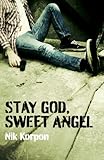

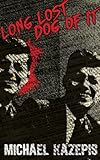
Not for Nothing by Stephen Graham Jones (Dzanc Books, March) — “A novel written in second person. The town is Stanton, Texas, population three thousand; the private investigator is disgraced Midland homicide detective Nicholas Bruiseman, who’s so down on his luck that he’s forced to take a job as a live-in security guard for the town’s lone storage facility. This is his new life—starting over with nothing in the town he grew up in.”
Stay God, Sweet Angel by Nik Korpon (Perfect Edge, Aprril) — “Damon lives a content life, playing video games and dealing drugs from his second-hand store while his girlfriend, Mary, drops constant hints about marriage. If only he could tell her his name isn’t really Damon. If only he could tell her who he really is. But after he witnesses a friend’s murder, a scarlet woman glides into his life, offering the solution to all of his problems. His carefully constructed existence soon shatters like crystal teardrops and he must determine which ghosts won’t stay buried – and which ones are trying to kill him – if he wants to learn why Mary has disappeared.””
A Beautiful Madness by Lee Thompson (DarkFuse, August) — “A Texas Senator and his wife go missing… On the same day, their son is slaughtered by an enigmatic killer on the lawn of ex-Governor Edward Wood’s residence. Sammy, Wood’s drug dealing son, suspects his father of the crime. After all, his old man snapped once before and crippled his wife with a lead pipe. But there’s something more to these events…something deeper and festering just beneath the surface… In direct opposition to Homicide Detective Jim Thompson, Sammy begins an investigation of his own, searching for the truth in a labyrinth of lies, deception, depravity and violence that drags him deeper into darkness and mayhem with each step. And in doing so, brings them all into the sights of an elusive and horrifying killer who may not be what he seems.” (Hat tip to The Examiner’s Josef Hernandez, who appears to be quite the fan of Thompson’s work.)
Long Lost Dog of It by Michael Kazepis (Broken River Books, April) — “June 5th, 2011. The streets of Athens are draped in a thick fog of tension. Hundreds of thousands of activists line the streets to protest the bankrupt government’s austerity measures. Riot police patrol the crowd and set up barricades across key intersections. A toothless vagrant scrambles to stay ahead of his past, a young couple struggles to piece their relationship back together, and a killer realizes too late that his number is up. Over the course of 48 hours, they will navigate a labyrinth of sex shows and dive bars, mob fronts and punk shows, fighting both their inner demons and the very real demon stalking the streets with a machine gun in his bag: a sociopathic hitman dressed to the nines and obsessed with JFK.”


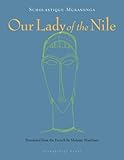

The Wall: A Novel by H.G. Adler, translated by Peter Filkins (Random House, December) — “[T]he final installment of Adler’s Shoah trilogy and his crowning achievement as a novelist, is available for the first time in English. Drawing upon Adler’s own experiences in the Holocaust and his postwar life, The Wall, like the other works in the trilogy, nonetheless avoids detailed historical specifics. The novel tells the story of Arthur Landau, survivor of a wartime atrocity, a man struggling with his nightmares and his memories of the past as he strives to forge a new life for himself. Haunted by the death of his wife, Franziska, he returns to the city of his youth and receives confirmation of his parents’ fates, then crosses the border and leaves his homeland for good.”
Pushkin Hills by Sergei Dovlatov, translated by Katherine Dovlatov (Counterpoint, March) — “An unsuccessful writer and an inveterate alcoholic, Boris Alikhanov has recently divorced his wife Tatyana, and he is running out of money. The prospect of a summer job as a tour guide at the Pushkin Hills Preserve offers him hope of regaining some balance in life as his wife makes plans to emigrate to the West with their daughter Masha, but during Alikhanov’s stay in the rural estate of Mikhaylovskoye, his life continues to unravel.”
Our Lady of the Nile: A Novel by Scholastique Mukasonga, translated by Melanie Mauthner (Archipelago, September) — “For her most recent work and first novel - Notre-Dame du Nil, originally published in March 2012 with Gallimard in French - Mukasonga immerses us in a school for young girls, called “Notre-Dame du Nil.” The girls are sent to this high school perched on the ridge of the Nile in order to become the feminine elite of the country and to escape the dangers of the outside world. The book is a prelude to the Rwandan genocide and unfolds behind the closed doors of the school, in the interminable rainy season. Friendships, desires, hatred, political fights, incitation to racial violence, persecutions… The school soon becomes a fascinating existential microcosm of the true 1970s Rwanda.”
The Sweetness of Life by Paulus Hochgatterer, translated by Jamie Bulloch (MacLehose Press, December) — “A German bestseller, winner of the European Union Prize for Literature, and longlisted for the German Book Prize in 2006, Paulus Hochgatterer has created a chilling psychological thriller. A group of damaged people living in a pleasant and seemingly tranquil Austrian village. It’s the Christmas holiday, the presents have been opened, and a six-year-old girl is drinking cocoa and playing with her grandfather. The doorbell rings, and the old man gets up. The next time the girl sees her grandfather, he is lying by the barn, his skull broken; his face a red pulp against the white snow. From that time on, she does not speak a single word. Along with Detective Superintendent Ludwig Kovacs, Raffael Horn, the psychiatrist engaged to treat the silent child, reluctantly becomes involved in solving the murder.”
Honorable mentions: In the Wolf’s Mouth: A Novel by Adam Foulds; The Year She Left Us: A Novel by Kathryn Ma; Clever Girl by Tessa Hadley; I Am China: A Novel by Xialu Guo; Dirtbags by Eryk Pruitt (Immortal Ink, April); Etched on Me by Jenn Crowell (Washington Square Press); The Life We Bury by Allen Eskens (Prometheus/Seventh Street Books); The Black Hour by Lori Raider-Day (Prometheus/Seventh Street Books); Cry For A Nickel, Die For A Dime by Woody Haut (Concord ePress, via LARB); and Ancient Oceans of Central Kentucky (Two Dollar Radio, August)
THE NEXT TEN MOST MISSING WTF GENRE IS THIS EVEN? OF 2014
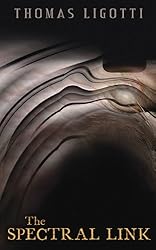
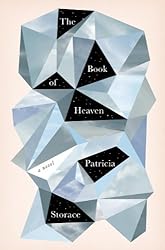
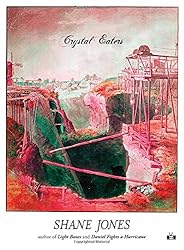
The Spectral Link by Thomas Ligotti (Subterranean, June) — a 96-page deluxe hardcover of two “surreal novelettes” by this enigmatic author brought to international attention by the plot of HBO’s True Detective. Here: “Throughout Ligotti’s ‘career’ as a horror writer, many of his stories have evolved from physical or emotional crises. And so it was with the surgical trauma that led to the stories in The Spectral Link, an event that is marginally mentioned in the first of these stories, ‘Metaphysica Morum.’ In the second story, ‘The Small People,’ Ligotti returns, although not precisely in the usual fashion, to his fixation with uncanny representations of the so-called human being.”
The Book of Heaven: A Novel by Patricia Storace (Pantheon, February) — “From the author of the classic travel memoir Dinner with Persephone, an accomplished poet, and frequent contributor to The New York Review of Books, here is an eagerly anticipated, stunningly original novel of heartrending lyricism about four women, a fierce mythopoeia that invites us to enter into a new and powerful imagination of the sublime: What if “a woman’s point of view” were God’s? As The Book of Heaven commences, Eve speaks about what is alleged to have happened in the Garden of Eden, a story she hardly recognizes. She tells her version of events, revealing that the constellations we are accustomed to seeing above conceal heavens with which we have yet to contend.”
Crystal Eaters by Shane Jones (Two Dollar Radio, Jul 1, 2014) — “Remy is a young girl who lives in a town that believes in crystal count: that you are born with one-hundred crystals inside and throughout your life, through accidents and illness, your count is depleted until you reach zero. As a city encroaches daily on the village, threatening their antiquated life, and the Earth grows warmer, Remy sets out to accomplish something no one else has: to increase her sick mother’s crystal count. An allegory, fable, touching family saga, and poetic sci-fi adventure, Shane Jones underlines his reputation as an inspired and unique visionary.” Along with praise from Vice, The Millions, HTML Giant, BuzzFeed, and others, reviewed by Gabino Iglesias as: “a strangely beautiful and surprisingly heart-wrenching tale that mixes fantasy, poetry, science fiction, and even something akin to rural noir.”



The Light and the Dark by Mikhail Shishkin (Quercus, January) — Via the WSJ: “The embers of the old-fashioned epistolary novel are revived by the breath of postmodern innovation in this exquisite Russian novel. Two lovers, Sashka and Volodya, write each other across a great separation—which, the reader soon discovers, is temporal as well as geographic. How the two can communicate across decades is never explained, but their bewitching letters create a story that’s as bold as it is romantic. ‘From Tolstoy,’ Mr. Shishkin said, ‘I learned not to fear being naïve.’ He also learned how to create narratives of searching spiritual wonderment.”
The Gospel of Z by Stephen Graham Jones (Samhain, January) — “In the ten years since zombies killed the world, Jory Gray has found exactly one person who matters. Her name is Linse. But when he wakes to find her gone, to join the church, his world falls apart all over again. Jory’s suicide mission to save her will lead him deep into the restricted zone, into the bowels of the military, the underbelly of the church, and, worse, it will give him a glimpse into a past that’s supposed to be ten years dead, a past still contained in a document that never should have existed: The Gospel of Z.”
Primordial: An Abstraction by D. Harlan Wilson (Anti-Oedipus Press, September) — “A nameless professor’s methods of teaching and scholarship become toxic; he is sent back to college to redo his Ph.D. and redeem his authority. This is only the beginning of terror. Life at the University isn’t what it used to be. Confronted by folly, redundancy and pornography at every turn, the professor must struggle to follow the rules and be a good student even as he terrorizes the roommates, faculty, staff and administrators that threaten to undermine his rancorous will to power.”



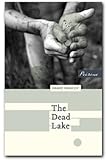
The Face of Any Other by Michael Seidlinger (Lazy Fascist Press, November) — “A man without a face infects the lives of others, becoming the person he discovers to be most interesting, feasting on their flaws, peering into their peculiarities in order to fulfill their meaningless desires. The main protagonist of the novel has lost his identity in favor of, much like a genie, being able to adopt, accentuate, and adorn the identities of others. He cannot remember his past or how this condition came to be; for all he knows, he’s always been faceless and invisible, forced to watch others, reading their eyes, interpreting every facial gesture, while seeking the most interesting flaw. He is one of the people, if only the people would notice him standing there, right next to them, staring back.”
The Symmetry Teacher: A Novel by Andrei Bitov and translated by Polly Gannon (FSG, July) — Published in Russian in 2008: “From one of the greatest Russian writers of the past half century comes a metaphysical mystery novel that defies categorization and confounds expectation. Andrei Bitov’s The Symmetry Teacher presents itself as the “echo” of an older British novel Bitov once read and had long forgotten. Unable even to recall the name of that novel’s author, Bitov reconstructs its literary vision through the fog of memory, creating a group of stories nestled together like a matryoshka doll. In doing so, Bitov evokes the anxieties of the late and post-Soviet decades, confronting urgent questions of conscience and self-deception through an innovative style that revels in paradox and sleight of hand.” (Hat tip to Locus Online yet again for this one.)
Haxan by Kenneth Mark Hoover (ChiZine, June) — “Thermopylae. Masada. Agincourt. And now, Haxan, New Mexico Territory, circa 1874. Through a sea of time and dust, in places that might never be, or can’t become until something is set right, there are people destined to travel. Forever. Marshal John T. Marwood is one of these men. Taken from a place he called home, he is sent to fight an eternal war. It never ends, because the storm itself, this unending conflict, makes the world we know a reality. Along with all the other worlds waiting to be born. Or were born, but died like a guttering candle in eternal night … Haxan is the first in a series of novels. “Lonesome Dove meets The Punisher … real, gritty, violent, and blatantly uncompromising.””
The Dead Lake by Hamid Ismailov, translated by Andrew Bromfield (Peirene Press, February) — “A haunting Russian tale about the environmental legacy of the Cold War. Yerzhan grows up in a remote part of Kazakhstan where the Soviets tests atomic weapons. As a young boy he falls in love with the neighbour’s daughter and one evening, to impress her, he dives into a forbidden lake. The radio-active water changes Yerzhan. He will never grow into a man. While the girl he loves becomes a beautiful woman.” (via NPR)
Honorable mentions: Say Anything But Your Prayers by Alan M. Clark (Lazy Fascist Press, August); The Fun We’ve Had by Michael J. Seidlinger (Lazy Fascist Press); Repo Shark by Cody Goodfellow (Broken River Books, April); Humanity Is The Devil by Jordan Krall (Morbid Books); The Last Lover by Can Xue (Yale University Press); The Loney by Andrew Hurley (Tartarus, via the James Herbert Award shortlist); Viper Wine by Hermione Eyre (an historical fantasy? sf? what?); and Jungle Horses by Scott Adlerberg (Broken River Books)
THE TEN MOST MISSING NOVELLAS of 2014:



Being Small by Chaz Brenchley (Per Aspera, August) — featured in the NY Times, a second well-lauded book for Brenchley this year to go along with his collection Bitter Waters, which is not on this list by dint of it happily being available in audio. Here: “British Fantasy Award winner Chaz Brenchley is well known for lyrical and elegantly written stories and novels. Now he has crafted a deeply personal ghost story of dead twins and mad mothers, of Moleskine notebooks and teen friendships, of AIDS care-givers and more. Michael’s shadow twin - Small - was his fetus in fetu before being removed and preserved in a specimen jar at the medical school. Michael and his single mother keep the rest of the world at bay while they hold the spirit of Small close - she homeschools Michael, moves house every six months, and at restaurants she asks for a table for three, ‘but there’ll only be the two of us eating.’ When Michael turns sixteen, he meets a household of men caring for Quin, dying of AIDS. Michael is drawn ever more deeply out of his lifelong conversation with his mother and Small and into the far more tangible world he finds at the house down the street with Quin, Kit, Gerard, and the others … and discovers some unexpected things about himself in the process.”
Yesterday’s Kin by Nancy Kress (Tachyon, Sep 9) — “Aliens have landed in New York. A deadly cloud of spores has already infected and killed the inhabitants of two worlds. Now that plague is heading for Earth, and threatens humans and aliens alike. Can either species be trusted to find the cure?” I have continued to enjoy Kress’ short novels, such as her previous for Tachyon, After the Fall, Before the Fall, During the Fall, which was one of my favorite books of 2013. This one’s not quite as strongly to my liking as “After the Fall…” but it’s exploring a topic in a compressed package that I have been thoroughly enjoying exploring at length in the form of Cixin Liu’s The Three-Body Problem.
Dream Houses by Genevieve Valentine (WSFA Press) — “It takes a certain type to crew a ship that drops you seven years at a time into the Deep. Kite-class cargo ships like Menkalinan get burned-out veterans, techs who’ve been warned off-planet, medics who weren’t much good on the ground. The Gliese-D run isn’t quite the end of the line, but it’s getting there. No cachet, no rewards, no future; their trading posts get Kites full of cargo that the crew never ask questions about, because if it’s headed for Gliese-D, it’s probably something nobody wanted. A year into the Deep, Amadis Reyes wakes up. Menkalinan is sounding the alarm; something’s wrong. The rest of the crew are dead. That’s not even what’s wrong.”



Exit, Pursued By a Bear by Greer Gilman (Small Beer Press, September) — “Ben Jonson has written the part of a lifetime for the Prince of Wales: he will play Oberon, the King of Faerie. It’s only theater. What could go wrong? Welcome to Ben Jonson’s second adventure, courtesy of none other than Greer Gilman. Her first exceptional Jonson adventure, Cry Murder! in a Small Voice, was a Shirley Jackson Award finalist.”
Jack in the Green by Charles de Lint and illustrated by Charles Vess (Subterranean, Apr 30, 2014) — “Maria Martinez is a young maid, cleaning houses to get by, living in a neighborhood of Santo del Vado Viejo plagued by gang violence and drug cartels. When Maria witnesses her best friend from her teenage years breaking into a house in a gated community where she’s working, she has no problem pretending to the police she didn’t see a thing. But as Luz Chaidez comes back into Maria’s life, Maria can’t help remembering the magic Luz left to look for all those years ago. In this deft novella, acclaimed fantasist Charles de Lint brings one of the world s most beloved tales into the modern day, transporting Robin Hood from the green wood to the barrio. Jack recasts an epic story of love and friendship, with justice at its center, in a way that readers won’t soon forget.”
Liminal: A Novella by Natasha Alvarez (Black and Green Press, Jul 25) — “a story about an environmental activist turned mother and lover. Having seen what civilization has done to our world, she has committed to drastic action. Told through letters, journal entries and photos, liminal is a walk through one year of her life. The joys, the sorrows, and the ultimate, and heart breaking decision that will change everything.” Reviewed very positively by Margaret Killjoy for The Anarcho-Geek Review: “I study anarchist fiction. I read fiction that anarchists write and I read what other people write about what anarchists do. And in all that time, I can’t say I’ve read anarchist fiction that’s more deeply engaged and poetic than Liminal.”




The Witch in the Almond Tree (The Witch’s Garden Series Book 1) by C.S.E. Cooney (Fairchild Books, July) — “In this sensational debut novella of The Witch’s Garden Series, C. S. E. Cooney introduces Mar, a Witch of Doornwald, who goes to her mother’s country home in order to relax from the demands of city life, but finds danger and passion instead. Faced with a haunted grove, a secretive stepfather, a mother who may be sharing her body with an ancient demon, and a mysterious young man named Wraith, what’s a Witch to do? Save the day. Rescue her mother. Win fair gentleman.”
Nobody’s Home by Tim Powers (Subterranean Press, December) — “For the first time in his esteemed career, Tim Powers returns to the setting (and a central character) from his landmark time travel novel, The Anubis Gates.” Of course, we still don’t have Salvage and Demolition, a Powers time travel novella published by Subterranean Press in January 2013, in audio yet, so whichever one you’d like to do first, audiobook publishers, any time.
The Broken Road by T. Frohock (The Story Vault, September) — “The world of Lehbet is under siege. The threads that divide Lehbet from the mirror world of Heled are fraying, opening the way for an invasion by an alien enemy that feeds on human flesh. Travys, the youngest of the queen’s twin sons, was born mute. He is a prince of the Chanteuse, nobles who channel their magic through their voices. Their purpose is to monitor the threads and close the paths between the worlds, but the Chanteuse have given themselves over to decadence. They disregard their responsibilities to the people they protect—all but Travys, who fears he’ll fail to wake the Chanteuse to Heled’s threat in time to prevent the destruction of Lehbet. Within the palace, intrigue creates illusions of love where there is none, and when Travys’ own brother turns against him, he is forced to flee all that he has known and enter the mirror world of Heled where the enemy has already won. In Heled, he must find his true voice and close the threads, or lose everyone that he loves.” Frohock wrote about the challenges of portraying a mute protagonist here.
Scale-Bright by Benjanun Sriduangkaew (Immersion Press, August) — “Julienne’s aunts are the archer who shot down the suns and the woman who lives on the moon. They teach her that there’s more to the city of her birth than meets the eye – that beneath the modern chrome and glass of Hong Kong there are demons, gods, and the seethe of ancient feuds. As a mortal Julienne is to give them wide berth, for unlike her divine aunts she is painfully vulnerable, and choice prey for any demon. Until one day, she comes across a wounded, bleeding woman no one else can see, and is drawn into an old, old story of love, snake women, and the deathless monk who hunts them.” Controversy surrounded the lauded new writer Sriduangkaew this year after it became known that she was also the pen behind the Requires Hate blog. If the reaction to her latest story (“And the Burned Moths Remain” at Tor.com) is any indication, the controversy shows no sign of slowing. If the story is any indication, neither does her prodigious talent, imagination, and lyricism.
Honorable mentions: The Beauty by Aliya Whiteley (Unsung Stories) and Messenger’s Legacy by Peter V. Brett (Subterranean) both via Nina Allan; Dodgeball High by Bradley Sands (Eraserhead Press); Calendrical Regression by Lawrence Schoen (NobleFusion); and The Last Log of the Lacrimosa by Alastair Reynolds (Subterranean)
TOP TWENTY MOST MISSING YOUNG ADULT AUDIOBOOKS of 2014:
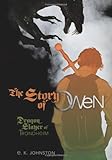

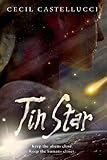

The Story of Owen: Dragon Slayer of Trondheim by E.K. Johnston (Carolrhoda, March) — a PW best book of 2014: “Listen! For I sing of Owen Thorskard: valiant of heart, hopeless at algebra, last in a long line of legendary dragon slayers. Though he had few years and was not built for football, he stood between the town of Trondheim and creatures that threatened its survival. There have always been dragons. As far back as history is told, men and women have fought them, loyally defending their villages. Dragon slaying was a proud tradition. But dragons and humans have one thing in common: an insatiable appetite for fossil fuels. From the moment Henry Ford hired his first dragon slayer, no small town was safe. Dragon slayers flocked to cities, leaving more remote areas unprotected. Such was Trondheim’s fate until Owen Thorskard arrived. At sixteen, with dragons advancing and his grades plummeting, Owen faced impossible odds—armed only with a sword, his legacy, and the classmate who agreed to be his bard. Listen! I am Siobhan McQuaid. I alone know the story of Owen, the story that changes everything. Listen!”
Kaleidoscope: Diverse YA Science Fiction and Fantasy Stories edited by Alisa Krasnostein and Julia Rios (Twelfth Planet Press, August) — “What do a disabled superhero, a time-traveling Chinese-American figure skater, and a transgender animal shifter have in common? They’re all stars of Kaleidoscope stories! Kaleidoscope collects fun, edgy, meditative, and hopeful YA science fiction and fantasy with diverse leads. These twenty original stories tell of scary futures, magical adventures, and the joys and heartbreaks of teenage life.” Subject of a Big Idea piece on Scalzi’s Whatever blog, an original YA fiction anthology with stories by Tansy Rayner Roberts, Ken Liu, Sean Williams, Sofia Samatar, Garth Nix, Vylar Kaftan, William Alexander, and more. Liu’s “Seventh Day of the Seventh Moon” was reprinted at Tor.com.
Tin Star by Cecil Castellucci (Roaring Brook, February) — “On their way to start a new life, Tula and her family travel on the Prairie Rose, a colony ship headed to a planet in the outer reaches of the galaxy. All is going well until the ship makes a stop at a remote space station, the Yertina Feray, and the colonist’s leader, Brother Blue, beats Tula within an inch of her life. An alien, Heckleck, saves her and teaches her the ways of life on the space station.”
Floating Boy and the Girl Who Couldn’t Fly by Stephen Graham Jones and Paul Tremblay (ChiZine, May) — Mary’s life is going fine. Except for being a freshman in high school. And having anxiety attacks. And her dad having no job. So, introduce one boy who can fly, kidnap the little brother she’s supposed to be babysitting, and drop a military quarantine on her town and that should make her anxiety completely disappear, right? Wrong!”




The Body Electric by Beth Revis (Scripturient Books, October) — “The future world is at peace. Ella Shepherd has dedicated her life to using her unique gift–the ability to enter people’s dreams and memories using technology developed by her mother–to help others relive their happy memories. But not all is at it seems.”
The Bodies We Wear by Jeyn Roberts (Knopf Books for Young Readers, September) — “People say when you take Heam, your body momentarily dies and you catch a glimpse of heaven. Faye was only eleven when dealers forced Heam on her and her best friend, Christian. But Faye didn’t glimpse heaven—she saw hell. And Christian died.”
The Silence of Six by E.C. Myers (Adaptive Books, November) — In a guest post for YA Books Central he writes: “Ever since I read Alvin’s Secret Code by Clifford Hicks when I was a kid, I have been fascinated with ciphers. This one is pretty easy to crack, but I got to play with some more challenging puzzles in THE SILENCE OF SIX. Designing a book cover is a little like cryptography: You try several different approaches and when you hit on the right one, it just fits. That’s how it was with this cover! As soon as I saw what the brilliant creative team at Adaptive Books had come up with, I knew it was the perfect image to convey the intrigue, technology, and darkness at the core of the story — without giving away too much.” The post includes an excerpt as well as this synopsis: “Haunted by the unforgettable image of his best friend’s death, Max’s entire world is upended as he suddenly finds himself the target of a corporate-government witch-hunt. Fearing for his life and fighting for his own innocence, Max is on the run with no one to trust and too many unanswered questions.”
Daughter of Chaos by Jen McConnel (Month9Books, March) — a new paranormal YA novel from the author of the Bloomsbury Spark-published The Secret of Isobel Key — description via IPG: “There comes a time in every witch’s life when she must choose her path. Darlena’s friends have already chosen, so why is it so hard for her to make up her mind? Now, Darlena is out of time. Under pressure from Hecate, the Queen of all witches, Darlena makes a rash decision to choose Red magic, a path no witch in her right mind would dare take. As a Red witch, she will be responsible for chaos and mayhem, drawing her deep into darkness. Will the power of Red magic prove too much for Darlena, or will she learn to control it before it’s too late?”




Black Dog by Rachel Neumeier (Angry Robot/Strange Chemistry, February) — “Natividad is Pure, one of the rare girls born able to wield magic. Pure magic can protect humans against the supernatural evils they only half-acknowledge—the blood kin or the black dogs. In rare cases—like for Natividad’s father and older brother—Pure magic can help black dogs find the strength to control their dark powers. But before Natividad’s mother can finish teaching her magic their enemies find them. Their entire village in the remote hills of Mexico is slaughtered by black dogs. Their parents die protecting them. Natividad and her brothers must flee across a strange country to the only possible shelter: the infamous black dogs of Dimilioc, who have sworn to protect the Pure. In the snowy forests of Vermont they are discovered by Ezekiel Korte, despite his youth the strongest black dog at Dimilioc and the appointed pack executioner. Intrigued by Natividad he takes them to Dimilioc instead of killing them.”
Stolen Songbird by Danielle L. Jensen (Angry Robot/Strange Chemistry, April) — “For five centuries, a witch’s curse has bound the trolls to their city beneath the ruins of Forsaken Mountain. Time enough for their dark and nefarious magic to fade from human memory and into myth. But a prophesy has been spoken of a union with the power to set the trolls free, and when Cécile de Troyes is kidnapped and taken beneath the mountain, she learns there is far more to the myth of the trolls than she could have imagined. Cécile has only one thing on her mind after she is brought to Trollus: escape. Only the trolls are clever, fast, and inhumanly strong. She will have to bide her time, wait for the perfect opportunity.” Via Books Without Any Pictures, who summarized it as: “A girl gets kidnapped by trolls who want her to marry their prince to fulfill a prophecy. Unfortunately, it didn’t work.”
The Elementalists by Chris Sharp (Diversion Books, October) — Via Slate.com’s Seth Stevenson: “I’m no fantasy fiction enthusiast. When I heard my friend Chris Sharp was writing a YA novel about dragons, I figured I’d pat him on the back for his accomplishment but that his book wouldn’t be for me. I was wrong! The Elementalists plops an ancient dragon into contemporary Charlottesville, Virginia, linking fantasy elements to a cautionary modern tale about climate change and pollution. The realistic, adolescent dramas buffeting our clever protagonist, high school sophomore Chloe McClellan, are just as well-crafted as the passages on Chinese mythology and five-clawed, flying beasts. There is light romance here, and some benign teen drug use, but I’d feel confident giving this book to smart, mature 13-year-olds.”
Heap House: The Iremonger Trilogy: Book One by Edward Carey (Overlook, October) — Via Amal El-Mohtar for NPR, who wrote: “How do I even begin to talk about this exceptional, astonishing book? Reading Heap House I was reminded of Edward Gorey, Lemony Snicket, and Roald Dahl; it’s a grimy world with a sepia glow, a Victoriana of malicious clutter. It’s an intelligent, thoughtful, compassionate book. It’s also gorgeously written. Heap House is, its heart of trash notwithstanding, an absolute treasure.”


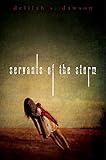

The Rule of Three by Eric Walters (Farrar, Straus & Giroux, January) — “Young adult novel, first of a trilogy, about a 16-year-old high school student when a global virus shuts down computers and cripples civilization.” (via Locus Online)
Expiration Day by William Campbell Powell (Tor Teen, April) —“It is the year 2049, and humanity is on the brink of extinction…. Tania Deeley has always been told that she’s a rarity: a human child in a world where most children are sophisticated androids manufactured by Oxted Corporation. When a decline in global fertility ensued, it was the creation of these near-perfect human copies called teknoids that helped to prevent the utter collapse of society. Though she has always been aware of the existence of teknoids, it is not until her first day at The Lady Maud High School for Girls that Tania realizes that her best friend, Siân, may be one.”
Servants of the Storm by Delilah S. Dawson (Simon Pulse, August) — a southern gothic, subject of a Big Idea piece on Scalzi’s Whatever blog: “A year ago, Hurricane Josephine swept through Savannah, Georgia, leaving behind nothing but death and destruction—and taking the life of Dovey’s best friend, Carly. Since that night, Dovey has been in a medicated haze, numb to everything around her. But recently she’s started to believe she’s seeing things that can’t be real…including Carly at their favorite café. Determined to learn the truth, Dovey stops taking her pills. And the world that opens up to her is unlike anything she could have imagined.”
Extraction by Stephanie Diaz (St. Martin’s Griffin, July) — “Clementine has spent her whole life preparing for her 16th birthday when she’ll be tested for Extraction, in the hopes of being sent from Kiel’s toxic Surface to the much safer Core, where people live without fear or starvation.”



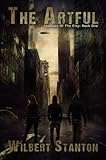
Blade Singer by Aaron de Orive and Martha Wells (Cloak & Dagger, June) — “Sure, Manny Boreaux wanted to escape his real world problems. But being trapped in the body of a goblin pickpocket wasn’t what he had in mind. Still, it’s kind of cool to be able to move like a spider monkey and go invisible. Unless you happen to work for an evil witch and her vicious gang of cutthroats. If they find out who he really is, they’ll turn him into minced pies!”
Threatened by Eliot Schrefer (Scholastic, February) — A National Book Award Finalist from the author of Endangered, which focused on the plight of African bonobos: “When he was a boy, Luc’s mother would warn him about the “mock men” living in the trees by their home — chimpanzees whose cries would fill the night. Luc is older now, his mother gone. He lives in a house of mistreated orphans, barely getting by. Then a man calling himself Prof comes to town with a mysterious mission. When Luc tries to rob him, the man isn’t mad. Instead, he offers Luc a job. Together, Luc and Prof head into the rough, dangerous jungle in order to study the elusive chimpanzees. There, Luc finally finds a new family — and must act when that family comes under attack.”
The Door in the Mountain by Caitlin Sweet (ChiTeen, May) — “The Greece of The Door in the Mountain (Book 1 of a two-part series) is a place where children are marked by gods and goddesses; a place where a manipulative, bitter princess named Ariadne devises a mountain prison for her hated half-brother, where a boy named Icarus tries, and fails, to fly, and a slave girl changes the paths of all their lives forever.”
The Artful (Shadows of the City, Book 1) by Wilbert Stanton (Curiosity Quills, May) — “New York City, 2025: Everything is changed. The city that never sleeps is now a land of death and decay. A rampant virus has taken over and the survivors have become carriers, quarantined from the rest of the world. Twist and Dodger grew up in the streets, the sewers and underground tunnels – their playground. They aren’t heroes. They just like attention; and stealing meds from the rich and giving them to the poor is their golden ticket. On their latest raid, they unknowingly steal a cure that puts them square between the ailing Emperor of Manhattan and the war hungry Governor of Brooklyn and forces them on a quest into the darkest shadows of their putrefying world.”
Honorable mentions: Resistance and Revolution by Jenna Black (Tor Teen, the second and third installments in the Replica series); The Grasshopper’s Child (Bold As Love Book 6) by Gwyneth Jones (“A near-future thriller for Young Adults, set in the Bold As Love world.”); Shadowboxer by Tricia Sullivan (Ravenstone, on kickboxing in Thailand); Emilie and the Sky World by Martha Wells (Strange Chemistry, a follow-on to Emilie and the Hollow World); Earth Star by Edwards, Janet (Pyr, US release for this follow-on to Earth Girl); Poisoned Apples: Poems for You, My Pretty by Christine Heppermann (Greenwillow, September); Rise of the Dragons (Kings and Sorcerers, Book 1) by Morgan Rice; Star Runners by L.E. Thomas; Of Metal and Wishes by Sarah Fine (Margaret K. McElderry Books, “set in a reimagined industrial Asia” with a ghost); Unmade by Sarah Rees Brennan (Random House); and Don’t Fall by Rachel Schieffelbein (Swoon Romance, a contemporary retelling of “Rapunzel”)
TOP TEN MOST MISSING MIDDLE GRADE NOVELS of 2014:



Centaur Rising by Jane Yolen (Henry Holt, October) — “One night during the Perseid meteor shower, Arianne thinks she sees a shooting star land in the fields surrounding her family’s horse farm. About a year later, one of their horses gives birth to a baby centaur. The family has enough attention already as Arianne’s six-year-old brother was born with birth defects caused by an experimental drug—the last thing they need is more scrutiny. But their clients soon start growing suspicious. Just how long is it possible to keep a secret? And what will happen if the world finds out?” [IndieBound]
Boys of Blur by N.D. Wilson (Random House Books for Young Readers, April) — “When Charlie moves to the small town of Taper, Florida, he discovers a different world. Pinned between the everglades and the swampy banks of Lake Okeechobee, the small town produces sugar cane … and the fastest runners in the country. Kids chase muck rabbits in the fields while the cane is being burned and harvested. Dodging flames and blades and breathing smoke, they run down the rabbits for three dollars a skin. And when they can do that, running a football is easy. But there are things in the swamp, roaming the cane at night, that cannot be explained, and they seem connected to sprawling mounds older than the swamps. Together with his step-second cousin “Cotton” Mack, the fastest boy on the muck, Charlie hunts secrets in the glades and on the muck flats where the cane grows secrets as old as the soft earth, secrets that haunted, tripped, and trapped the original native tribes, ensnared conquistadors, and buried runaway slaves. Secrets only the muck knows. “
Tommy Black and the Staff of Light by Jake Kerr (Currents and Tangents, November) — debut novel from Nebula Award nominated author (“The Old Equations” in Lightspeed) — “For fourteen-year-old Tommy Black, nothing is worse than being raised by an overprotective grandfather in the city that never sleeps. That is until his grandfather is captured by magical creatures and Tommy has to save him with his family’s magical staff. That wouldn’t be so bad, but the only magic he can do with the staff is weak–making light. What the heck can you do with light? Tommy finds out as he fights golems, shadow creatures, and djinn in a journey that features a magical river, an enchanted train, and an illusionary fortress. But the worst part of all? Tommy has to save his grandfather with the help of Naomi, a girl whose talent with magic is only rivaled by her ability to hurl insults.” — Ken Liu says: “Jake Kerr has told an exciting coming-of-age tale that asks serious ethical questions about the costs of magic. This is a world that will stay with the reader long after the last page.”
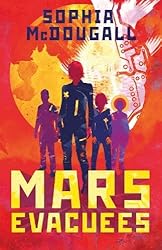
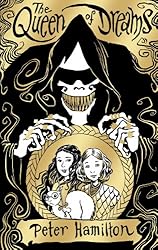

Mars Evacuees by Sophia McDougall (Egmont Books, March) — “The fact that someone had decided I’d be safer on Mars, where you could still only SORT OF breathe the air and SORT OF not get sunburned to death, was a sign that the war with the aliens was not going fantastically well. When Alice Dare finds out that she’s being evacuated to Mars to join the youth defence force, she isn’t sure what to expect.” A US release (with a much less appealing cover) is set for February from HarperCollins, so perhaps we’ll see an audio release then.
The Queen of Dreams by Peter Hamilton (Doubleday UK, January) — first children’s book by the epic sf author Peter F. Hamilton: “Taggie and Jemima are summer holidaying on their dad’s farm. They know just what to expect – a tumbledown cottage, sunshine and strawberry-picking. But then Jemima sees a white squirrel wearing glasses … And things become even more extraordinary when their dad is captured and whisked away to a faerie world. Magical adventures await, as the two sisters discover powers they never knew they had and a series of worlds to explore. But can Taggie and Jemima rescue their dad and defeat the evil King of Night?”
The Castle Behind Thorns by Merrie Haskell (Katherine Tegen, May) — “This magical adventure in an enchanted castle surrounded by thorns tells a tale of the power of memory and story, forgiveness and strength, and the true gifts of craft and imagination. By the acclaimed author of The Princess Curse and Handbook for Dragon Slayers, this original fantasy is perfect for fans of Gail Carson Levine, Karen Cushman, and Shannon Hale.”




The Forbidden Library by Django Wexler (Kathy Dawson Books, April) — “When Alice’s father goes down in a shipwreck, she is sent to live with her uncle Geryon–an uncle she’s never heard of and knows nothing about. He lives in an enormous manor with a massive library that is off-limits to Alice. But then she meets a talking cat. And even for a rule-follower, when a talking cat sneaks you into a forbidden library and introduces you to an arrogant boy who dares you to open a book, it’s hard to resist. Especially if you’re a reader to begin with. Soon Alice finds herself INSIDE the book, and the only way out is to defeat the creature imprisoned within.” — audiobook coming March 17 from Listening Library
Cuckoo Song by Frances Hardinge (Macmillan Children’s Books, May) — looks like a fairly creepy book for young readers along the lines of Neil Gaiman’s Coraline but for an audience closer to young teens — “When Triss wakes up after an accident, she knows that something is very wrong. She is insatiably hungry; her sister seems scared of her and her parents whisper behind closed doors. She looks through her diary to try to remember, but the pages have been ripped out.”
The League of Seven by Alan Gratz and illustrated by Brett Helquist (Tor/Starscape, August) — “In an alternate 1875 America electricity is forbidden, Native Americans and Yankees are united, and eldritch evil lurks in the shadows. Young Archie Dent knows there really are monsters in the world. His parents are members of the Septemberist Society, whose job it is to protect humanity from hideous giants called the Mangleborn. Trapped in underground prisons for a thousand years, the giant monsters have been all but forgotten—but now they are rising again as the steam-driven America of 1875 rediscovers electricity, the lifeblood of the Mangleborn. When his parents and the rest of the Septemberists are brainwashed by one of the evil creatures, Archie must assemble a team of seven young heroes to save the world.”
The Eighth Continent by Matt London (Razorbill, September) — “Evie and Rick Lane are determined to transform the Great Pacific Garbage Patch—a real life pile of floating garbage—into an eighth continent, using a special formula developed by their father. This new continent will be a place where their family can make their own rules and live free from the intervention of Winterpole, a global governing agency run by bumbling bureaucrats. But eleven-year-old pink-and-plastic-obsessed Vesuvia Piffle, the secret mastermind behind the villainous Condo Corp, also has her sights set on this new land, and she wants to use it to build a kind of Miami-on-steroids. Now, it’s a race against time and across the world as the kids gather the items they need to create their continent. Because whoever controls the eighth continent controls our future. And the future can’t be both “green” and pink.” There’s also a “Build it. Run it. Rule it.” website and a two additional books forthcoming in 2015.
Honorable mentions: Bo-Aku: Undisputed King of the Forest by Emmanuel Ngwainmbi (Crossroad Press, delightful linked collection of Cameroonian folk tales); Tut: The Story of My Immortal Life by P. J. Hoover (Tor/Starscape, King Tut, living as an eighth-grader in modern-day Washington DC.); The Last Changeling by Jane Yolen (Viking Children’s, sequel to The Hostage Prince); The Tinker King by Tiffany Trent (Simon & Schuster Books for Young Readers, sequel to Steampunk fantasy The Unnaturalists)
THE NEXT TWENTY MOST MISSING ANTHOLOGIES of 2014:
[In the interests of time, I'm going to have to come back in to add cover images and additional supporting text later.]Long Hidden: Speculative Fiction from the Margins of History edited by Rose Fox and Daniel Jose Older (Crossed Genres, May) — Kickstarter backers may have got it a bit early, but it was formally published to the world this year, a fantastic anthology under two fantastic editors with a fantastic Big Idea behind it: “These gripping stories have been passed down through the generations, hidden between the lines of journal entries and love letters. Now 27 of today’s finest authors – including Tananarive Due, Sofia Samatar, Ken Liu, Victor LaValle, Nnedi Okorafor, and Sabrina Vourvoulias – reveal the people whose lives have been pushed to the margins of history.”
War Stories edited by Jaym Gates and Andrew Liptak (Apex Books, October 7, 2014) — initially funded by Kickstarter, an original anthology of military sf with stories from (among others) Joe Haldeman, Ken Liu, Linda Nagata, Maurice Broaddus, Jay Posey, Yoon Ha Lee, T.C. McCarthy, and Karin Lowachee [full table of contents and an interview with the editors].
Fearful Symmetries edited by Ellen Datlow (ChiZine, May 27, 2014) — “In addition to sixteen stories specifically solicited for the anthology, Ellen Datlow chose four stories submitted during the month-long open reading period, adding some excellent new writers to the mix. So in addition to award-winning and/or bestselling writers such as Brian Evenson, Jeffrey Ford, Caitlin R. Kiernan, Pat Cadigan, and Michael Marshall Smith, there are a few names with whom readers might not yet be familiar—yet. Writers such as Siobhan Carroll, Catherine MacLeod, and Carole Johnstone. Each writer in this book has a unique voice, and this multitude of voices has created a symphony that will continue to be appreciated for many years to come.”
Phantasm Japan: Fantasies Light and Dark, From and About Japan edited by Nick Mamatas (Haikasoru, Sep 16, 2014) — another original trade paperback anthology edited by Mamatas for VIZ Media’s Haikasoru sf/f prose imprint after 2012′s well-received The Future is Japanese.
Irregularity edited by Jared Shurin (Jurassic London, Jul 24) — “Using the Longitude Act as the jumping off point, Irregularity is inspired by the great thinkers of the Age of Reason – those courageous men and women who set out to map, chart, name and classify the world around them. The great minds who brought order and discipline to the universe. Except where they didn’t.” [Kobo]
Upgraded edited by Neil Clarke (Wyrm Publishing, September 23, 2014) — “An anthology of original cyborg stories edited by a cyborg. Stronger. Better. Faster. We will rebuild you.
Nightmare Carnival edited by Ellen Datlow (Dark Horse Books, Oct 7, 2014) — new anthology includes (among others) Nick Mamatas, Nathan Ballingrud, Jeffrey Ford, Genevieve Valentine, Stephen Graham Jones, Robert Shearman, and Laird Barron.
Dangerous Games edited by Jonathan Oliver (Solaris, Dec 4) — “In a world of chances, one decision can bring down the house, one roll of the dice could bring untold wealth, or the end of everything. In this anthology of all new short stories the players gather, their stories often dark, and always compelling.
Reach for Infinity edited by Jonathan Strahan (Solaris, May 27) — “What happens when humanity reaches out into the vastness of space? The brightest names in SF contribute new orginal fiction to this amazing anothology from master editor Jonathan Strahan. Including new work by Alastair Reynolds,Greg Egan,Ian McDonald, Ken Macleod, Pat Cadigan, Karl Schroeder, Hannu Rajaniemi, Karen Lord, Adam Roberts, Kathleen Ann Goonan, Aliette de Bodard Peter Watts, and others.”
Fearsome Magics edited by Jonathan Strahan, with stories by K.J. Parker, Scott Lynch, Christopher Priest, and more (Oct 7, 2014) — “Anthology of 14 original fantasy stories; a follow-up to the 2013 anthology Fearsome Journeys.”
Shattered Shields edited by Jennifer Brozek and Bryan Thomas Schmidt (Baen, Nov 4) — a military fantasy anthology with headliners Glen Cook (Black Company), Larry Correia, John Marco, Elizabeth Moon (new Paksenarrion), David Farland (new Runelords), Catherine Asaro, Sarah A. Hoyt, Robin Wayne Bailey.
Neverland’s Library: Fantasy Anthology by Mark Lawrence, Marie Brennan, Jeff Salyards and Miles Cameron (Apr 20, 2014) — “DRAGONS, MAGIC, PRINCESSES OF MIGHTY KINGDOMS … elements of fantasy that have carried on throughout the many ages, and yet, may one day be forgotten. Enter and delve into the roots of fantasy, rediscovering the fantastic, and exploring lost worlds. NEVERLAND’S LIBRARY is storytelling at its finest. This collection of original works will take readers back to that moment when they first fell in love with the genre. Featuring an introduction by TAD WILLIAMS and stories from writers across the spectrum such as Mark Lawrence, Marie Brennan, R.S. Belcher, Miles Cameron, Teresa Frohock, Don Webb, Joseph R. Lallo, and more. This is a collection worthy of one’s library.”
Year’s Best Weird Fiction Volume 1 edited by Laird Barron (ChiZine, Oct 7, 2014) — inaugural edition of a new, rotating-editor year’s best anthology for Weird fiction, with authors (among others) including Jeff VanderMeer, Jeffrey Ford, Sofia Samatar, Joseph S. Pulver Sr, John Langan, Richard Gavin, and W. H. Pugmir.
The Children of Old Leech edited by Ross E. Lockhart and Justin Steele (Word Horde, Jul 15) — “A Tribute to the Carnivorous Cosmos of Laird Barron. There are Things – terrifying Things – whispered of in darkened forests beyond the safe comfort of firelight: The Black Guide, the Broken Ouroboros, the Pageant, Belphegor, Old Leech… These Things have always been here. They predate you. They will outlast you. This book pays tribute to those Things. For We are the Children of Old Leech… and we love you.” With stories from: Gemma Files, Jesse Bullington, Michael Cisco, Molly Tanzer, Paul Tremblay, Stephen Graham Jones, John Langan, and others.
Solaris Rising 3: The New Solaris Book of Science Fiction edited by Ian Whates, with stories by Aliette de Bodard, Adam Roberts, Ken Liu, and more (Solaris, Aug 26, 2014)
Nature Futures 2: Science Fiction from the Leading Science Journal edited by Henry Gee and Colin Sullivan (Tor, Sep 9, 2014) — “100 writers – including Neal Asher, Elizabeth Bear, Gregory Benford, Tobias Buckell, Brenda Cooper, Kathryn Cramer, David Langford, Tanith Lee, Ken Liu, Nick Mamatas, Norman Spinrad, Ian Stewart, Rachel Swirsky, Adrian Tchaikovsky and Ian Watson – offer their take on what the future will look like in this anthology of sci-fi short stories from the award-winning Futures column in the science journal Nature.”
Geek Theater: 15 Plays by Science Fiction & Fantasy Writers edited by Jen Gunnels and Erin Underwood (Underwords Press, Nov 4) — David Hartwell says: “In case you didn’t know, there is such a thing as SF theater. It has been around for a long time, and there is quite a lot of it. In recent years there has been a strong growth and diversification, a lot of new plays, original, not adaptations of stories–though there are a lot of those too. This is a book full of the new stuff, original plays that, all together point to a renaissance of SF theater. Pay attention, and it will blow you away!” And yes, it’s got John Kessel’s Faustfeathers.
Sword & Laser Anthology edited by Tom Merritt and Veronica Belmont, with an foreword by Patrick Rothfuss (Sword and Laser, May 2014) — “Twenty never-before-published short stories span the worlds of science fiction and fantasy, inviting readers of both genres to lose themselves in tales sometimes humorous, sometimes terrifying, and always engrossing.” With stories from (among others) Aidan Moher, Adam Callaway, and Jacob Boyd
The Apex Book of World SF 3 edited by Lavie Tidhar (Apex Books, July 8)
Searchers After Horror edited by S.T. Joshi (Fedogan and Bremer, June 1, 2014) — “21 “New Tales of the Weird and Fantastic” selected by noted authority S.T. Joshi, nearly all to be published here for the very first time … Fine weird stories by Caitlin Kiernan, Donald Tyson, Ramsey Campbell, W.H. Pugmire, …”
Honorable mention: Sword & Mythos edited by Silvia Moreno-Garcia and Paula R. Stiles (Innsmouth Free Press); Handsome Devil: Stories of Sin and Seduction edited by Steve Berman (Prime Books); Magic City: Recent Spells edited by Paula Gauran (Prime Books, previously-published stories of urban fantasy); The Cutting Room: Dark Reflections of the Silver Screen edited by Ellen Datlow (Tachyon); STRAEON edited by M. David Blake (Rampant Loon, beginning a new original short fiction anthology series from the author of “Absinthe Fish” and editor of the Campbellian Anthology pre-reading anthology series); The Mammoth Book Of Gaslit Romance edited by Ekaterina Sedia (Robinson/Running Press); The Time Traveler’s Almanac by Ann VanderMeer and Jeff VanderMeer (Tor, published last year in the UK, a definitive anthology of time travel stories gets a fantastic US release; read the preface at The Onion’s AV Club and Jason Sheehan’s review for NPR); Two Hundred Twenty-One Baker Streets edited by David Thomas Moore (Abaddon Books); The Book of Silverberg: Stories in Honor of Robert Silverberg edited by William Schafer and Gardner Dozois (Subterranean Press); Dreams of Shadow and Smoke: Stories for J.S. Le Fanu edited by Jim Rockhill and Brian J. Showers (Swan River Press); The Girl at the End of the World, Volume 1 and The Girl at the End of the World, Volume 2 edited by Adele Wearing (Fox Spirit Books); The Baen Big Book of Monsters edited by Hank Davis (Baen); Two Hundred Twenty-One Baker Streets (Abaddon Books); The Starry Wisdom Library edited by Nate Pederson (PS Publishing); and Qualia Nous edited by by Michael Bailey (Written Backwards)
NEXT TWENTY MOST MISSING COLLECTIONS of 2014:
[In the interests of time, I'm going to have to come back in to add cover images and additional supporting text later.]Unexpected Stories by Octavia E. Butler (Open Road Media, June 24) – “Two never-before-published stories from the archives of one of science fiction’s all-time masters. The novella “A Necessary Being” showcases Octavia E. Butler’s ability to create alien yet fully believable “others.” Tahneh’s father was a Hao, one of a dwindling race whose leadership abilities render them so valuable that their members are captured and forced to govern. When her father dies, Tahneh steps into his place, both chief and prisoner, and for twenty years has ruled without ever meeting another of her kind. She bears her loneliness privately until the day that a Hao youth is spotted wandering into her territory. As her warriors sharpen their weapons, Tahneh must choose between imprisoning the newcomer—and living the rest of her life alone. The second story in this volume, “Childminder,” was commissioned by Harlan Ellison for his legendary (and never-published) anthology The Last Dangerous VisionsTM. A disaffected telepath connects with a young girl in a desperate attempt to help her harness her growing powers. But in the richly evocative fiction of Octavia E. Butler, mentorship is a rocky path, and every lesson comes at a price.”
Questionable Practices: Stories by Eileen Gunn (Small Beer Press, March) — via io9: “Gunn is one of the most canny short-story writers out there, and this collection of strange, sharp tales is filled with lost souls searching for some obscure meaning to their existence. There’s a golem who just wants to return to clay, a sasquatch who unexpectedly becomes a TV star, and a number of young heroes trapped in dark fables. Gunn’s talent for the surreal and bizarre is pressed into the service of exploring how our own subjectivity, and the ways we construct our selves, help to imprison us.”
Unseaming by Mike Allen (Antimatter Press, Oct. 7, 2014) – With an introduction by Laird Barron: “Mike Allen has put together a first class collection of horror and dark fantasy. Unseaming burns bright as hell among its peers.”
Gifts for the One Who Comes After by Helen Marshall (ChiZine, Sep 16, 2014) — “This is one of the books you will always remember reading for the first time. It’s really that good.” -Nathan Ballingrud
The Corpse Exhibition: And Other Stories of Iraq by Hassan Blasim, translated by Jonathan Wright (Penguin, February) — Via Jeff VanderMeer at Electric Lit, though I recall seeing him mention it earlier in the year as well. “The first major literary work about the Iraq War from an Iraqi perspective, The Corpse Exhibition shows us the war as we have never seen it before. Here is a world not only of soldiers and assassins, hostages and car bombers, refugees and terrorists, but also of madmen and prophets, angels and djinni, sorcerers and spirits. Blending shocking realism with flights of fantasy, Hassan Blasim offers us a pageant of horrors, as haunting as the photos of Abu Ghraib and as difficult to look away from, but shot through with a gallows humor that yields an unflinching comedy of the macabre. Gripping and hallucinatory, this is a new kind of storytelling forged in the crucible of war.”
After the People Lights Have Gone Off by Stephen Graham Jones (Dark House Press, Sep 9, 2014) — featured in Jeff VanderMeer’s recent write-up additions to Jones’ (at Weird Fiction Review) “Flowchart of the Damned”.
Our Love Will Go the Way of the Salmon by Cameron Pierce (Broken River Books, December 2014) — reviewed at Electric Literature as: “Fish stories and memories haunt these characters’ lives and many are unable to escape their own fears and base drives. Pierce’s characters tell stories that are not to be believed. Our Love Will Go the Way of the Salmon challenges our understanding of why we seek out opportunities to kill for sport. Does it say something about us that we bond while hunting lesser animals? For Pierce, fishing is both calming hobby and barbarous obsession. His characters are caught somewhere in between.”
Irredeemable by Jason Sizemore (Seventh Star Press) — “Featuring twenty one tales of dark SF and horror, many of which have flavors of Appalachia, Irredeemable brings together a number of Jason’s previously published stories and features two brand new ones.” — the cover is from Polish artist Tomasz Trafial.
Dead Americans and Other Stories by Ben Peek (ChiZine, Mar 18, 2014) — “A collection of the critically acclaimed dark, weird, and surreal short fiction of Ben Peek. It presents a world where bands are named after the murderer of a dead president, where the work of Octavia E. Butler is turned into an apocalypse meta-narrative, and John Wayne visits a Wal-Mart. It presents a world where a dying sun shines over a broken, bitter landscape and men and women tattoo their life onto their skin for an absent god. It presents a zombie apocalypse, Mark Twain dreaming of Sydney, and answers a questionnaire you never read.”
Ladies of the Night: Short Stories by Maggie McNeill by Maggie McNeilland Chester Brown (Feb 11, 2014) — “This book, her first published collection, contains thirty-seven stories ranging from fantasy to reality and from comedy to horror, whose heroines are all quite different from one another but have one thing in common: membership in the world’s oldest profession.”
The Nickronomicon by Nick Mamatas (Inssmouth Free Press, November 18, 2014) — collects all of Mamatas’ Lovecraft-inspired fiction into a single volume, including a new, never-before-published novella, titled “On the Occasion of My Retirement.”
Scruffians! Stories of Better Sodomites by Hal Duncan (Lethe Press, April 1)
Toad Words And Other Stories by T. Kingfisher (Red Wombat Tea Company, “T. Kingfisher” is a pseudonym for children’s author (and Hugo Award winning graphic novelist) Ursula Vernon)
The Law & the Heart by Kenneth Schneyer (Stillpoint Digital, May 16) — “Exploring the seams where humanity and technology, society and individuality intersect, Nebula- and Sturgeon-nominated author Kenneth Schneyer presents thirteen mind-bending, thought-provoking tales of near and far futures that will amuse, amaze, and unsettle. The law will change, and the heart will change, and the heart will change the law. These stories confront the question of just what makes and keeps us human.”
The Man Who Made Models: The Collected Short Fiction by R.A. Lafferty (Centipede Press, Feb 11, 2014)
Last Stories and Other Stories by William T. Vollmann (July 10) – “Vollmann has over 30 years and damn near as many books earned a reputation as a wildly prolific novelist. Still, almost a decade has passed since his last full-length work of fiction, the National Book Award-winning Europe Central. Here, he offers what may have started as a suite of ghost stories… but is now another sprawling atlas of Vollmann’s obsessions. Stories of violence, romance, and cultural collision are held together by supernatural elements and by Vollmann’s psychedelically sui generis prose.” (via Porochista Khakpour at The Millions)
Young Woman in a Garden: Stories by Delia Sherman (Small Beer Press, Nov 1) — “Lightly flecked with fantasy and anchored in vividly detailed settings, the 14 stories in Sherman’s first collection are distinguished by determined women who challenge gender roles in order to make their way in the world. Wry humor leavens the serious themes.” (via PW’s best books of 2014)
Things We Found During the Autopsy by Kuzhali Manickavel (Blaft, October) — “Things We Found During the Autopsy is South Indian writer Kuzhali Manickavel’s second collection of short fiction, in which she presents a dizzying array of apocalyptic visions and fractured childhood memories. These stories contain the following: a dragon; angels; Indian culture; one Christmas story for children; no Indian culture whatsoever; men; poor people; voluntarily homeless youths; women; drugs; sex; Indian dads in cold foreign countries; vomit; boys; girl’s hostels; girls; future tense; the Tropicool Icy-Land Urban Indian Slum; ash, and the people who eat ash; authentic village life written from a privileged English-speaking perspective; homosexuals; white people; references to Rajinikanth; non-italicized Tamil words; whores; brain aneurysms; Western dance in South Indian women’s colleges; Pazhani; floods; shapeshifters; men named Kathir; minty-fresh non-cola cola; and wannabe Naxalites.” Reviewed quite positively in Strange Horizons.
The Woman Who Borrowed Memories: Selected Stories of Tove Jansson translated by Thomas Teal and Silvester Mazzarella (NYBR Classics)
Prophecies, Libels & Dreams by Ysabeau S. Wilce (Small Beer Press, Oct 14, 2014) — print edition coming in November: “These inter-connected stories are set in an opulent quasi-historical world of magick and high manners called the Republic of Califa. The Republic is a strangely familiar place—a baroque approximation of Gold Rush era-California with an overlay of Aztec ceremony—yet the characters who populate it are true originals: rockstar magicians, murderous gloves, bouncing boy terrors, blue tinted butlers, sentient squids, and a three year old Little Tiny Doom and her vengeful pink plush pig.”
Honorable mentions: The Very Best of Tad Williams by Tad Williams (Tachyon); Black Gods Kiss by Lavie Tidhar (PS Publishing, a return to the vivid world of his 2012 British Fantasy Award winning novella, Gorel & The Pot-Bellied God); Internal Medicine: A Doctor’s Stories by Terrence Holt (Liverlight Publishing, a BookPage Best Book of 2014); Knife Fight and Other Struggles by David Nickle (ChiZine); How a Mother Weaned Her Girl from Fairy Tales by Kate Bernheimer (Coffee House Press); Academic Exercises by K. J. Parker (Subterranean Press); The Court of Lies by Mark Teppo (Fairwood Press); Blood Splatters Quicky by Edward D. Wood, Jr. (OR Books); Bard’s Road: The Collected Fiction of Lee Martindale by Lee Martindale (HarpHaven); Irregular Verbs and Other Stories by Matthew Johnson (ChiZine); Soft Apocalypses by Lucy A. Snyder (Raw Dog Screaming Press); Her Husband’s Hands and Other Stories by Adam-Troy Castro (Prime Books); Incarnations by Chris Deal (Broken River Books); Skin Deep Magic: Short Fiction by Craig Laurance Gidney (Rebel Satori Press); They Do the Same Things Different There by Robert Shearman (ChiZine); The Shape of Every Monster Yet to Come by Brian Allen Carr (Lazy Fascist Press); Down Where the Devil Don’t Go by Paul Bingham; Praying Drunk by Kyle Minor (Sarabande Books); and Dinosaurs and a Dirigible by David Drake (Baen)
NEXT TEN MOST MISSING NON-FICTION of 2014:
[In the interests of time, I'm going to have to come back in to add cover images and additional supporting text later.]Battle Royale Slam Book: Essays on the Cult Classic edited by Nick Mamatas (Haikasoru, April 1) — “The cult phenomenon Battle Royale has been lauded as a masterpiece and decried as exploitative gore, but it’s always remained in the public consciousness. This collection of essays by some of the best science fiction, horror, and thriller writers working today explore the depth, details, and controversies surrounding Battle Royale in an intelligent, accessible fashion.”
Wild Connection: What Animal Courtship and Mating Tells Us about Human Relationships by Jennifer L. Verdolin (Prometheus Books, Jun 3) — “A specialist in animal behavior compares the courtship rituals and mating behaviors of animals to their human equivalents, revealing the many and often surprising ways we are both similar to and different from other species.”
Pagan Britain by Ronald Hutton (Yale University Press, Feb 25) — “What do we really know about Stonehenge and druids? Is the Uffington White Horse actually a cat? This study questions all claims about prehistoric rituals and religion.” (hat tip to Dan Campbell)
Green Planets: Ecology and Science Fiction edited by Gerry Canavan and Kim Stanley Robinson (Wesleyan, April 1) — “Contemporary visions of the future have been shaped by hopes and fears about the effects of human technology and global capitalism on the natural world. In an era of climate change, mass extinction, and oil shortage, such visions have become increasingly catastrophic, even apocalyptic. Exploring the close relationship between science fiction, ecology, and environmentalism, the essays in Green Planets consider how science fiction writers have been working through this crisis. Beginning with H. G. Wells and passing through major twentieth-century writers like Ursula K. Le Guin, Stanislaw Lem, and Thomas Disch to contemporary authors like Margaret Atwood, China Miéville, and Paolo Bacigalupi—as well as recent blockbuster films like Avatar and District 9—the essays in Green Planets consider the important place for science fiction in a culture that now seems to have a very uncertain future.”
Letters of Note: Correspondence Deserving of a Wider Audience edited by Shaun Usher (Chronicle Books, May) — via Brain Pickings in particular, but it’s one I’ve seen pop up in discussion all year.
The Last Beach by Orrin H. Pilkey and J. Andrew G. Cooper (Duke University Press, November 2014) — “an urgent call to save the world’s beaches while there is still time. The geologists Orrin H. Pilkey and J. Andrew G. Cooper sound the alarm in this frank assessment of our current relationship with beaches and their grim future if we do not change the way we understand and treat our irreplaceable shores. Combining case studies and anecdotes from around the world, they argue that many of the world’s developed beaches, including some in Florida and in Spain, are virtually doomed and that we must act immediately to save imperiled beaches.”
Along Those Lines: The Boundaries that Create Our World by Peter Cashwell (Paul Dry Books, May 13, 2014) — “After years of crossing borders to see new birds and new landscapes, Peter Cashwell’s exploration of lines between states, between time zones, and between species led him to consider the lines that divide genders, seasons, musical genres, and just about every other aspect of human life. His conclusion: most had something in common—they were largely imaginary.”
Unspeakable Things: Sex, Lies and Revolution by Laurie Penny(Bloomsbury USA, Jul 3, 2014) — “Smart, clear-eyed, and irreverent, Unspeakable Things is a fresh look at gender and power in the twenty-first century, which asks difficult questions about dissent and desire, money and masculinity, sexual violence, menial work, mental health, queer politics, and the Internet.”
The People’s Platform: Taking Back Power and Culture in the Digital Age by Astra Taylor (Metropolitan Books, April) — “The Internet has been hailed as an unprecedented democratizing force, a place where everyone can be heard and all can participate equally. But how true is this claim? In a seminal dismantling of techno-utopian visions, The People’s Platform argues that for all that we “tweet” and “like” and “share,” the Internet in fact reflects and amplifies real-world inequities at least as much as it ameliorates them. Online, just as off-line, attention and influence largely accrue to those who already have plenty of both. What we have seen so far, Astra Taylor says, has been not a revolution but a rearrangement. Although Silicon Valley tycoons have eclipsed Hollywood moguls, a handful of giants like Amazon, Apple, Google, and Facebook remain the gatekeepers.”
There Was and There Was Not: A Journey Through Hate and Possibility in Turkey, Armenia, and Beyond by Meline Toumani (Metropolitan Books, November) — “Meline Toumani grew up in a close-knit Armenian community in New Jersey where Turkish restaurants were shunned and products made in Turkey were boycotted. The source of this enmity was the Armenian genocide of 1915 at the hands of the Ottoman Turkish government, and Turkey’s refusal to acknowledge it. A century onward, Armenian and Turkish lobbies spend hundreds of millions of dollars to convince governments, courts and scholars of their clashing versions of history. Frustrated by her community’s all-consuming campaigns for genocide recognition, Toumani leaves a promising job at The New York Times and moves to Istanbul. Instead of demonizing Turks, she sets out to understand them, and in a series of extraordinary encounters over the course of four years, she tries to talk about the Armenian issue, finding her way into conversations that are taboo and sometimes illegal. Along the way, we get a snapshot of Turkish society in the throes of change, and an intimate portrait of a writer coming to terms with the issues that drove her halfway across the world.”
Honorable mentions: Science Fiction, Alien Encounters, and the Ethics of Posthumanism: Beyond the Golden Rule by Elana Gomel (Palgrave Macmillan); Klingon Art of War by Keith R. A. DeCandido (Pocket Books/Star Trek); What Makes This Book So Great by Jo Walton (Tor, a collection of Walton’s essays and reviews from Tor.com); Like Tears in Rain: Meditations on Science Fiction Cinema by Alex Kane; Rhapsody: Notes on Strange Fictions by Hal Duncan (Lethe Press); Kathryn Allan’s Disability in SF (via Aishwarya Subramanian at Strange Horizons); Stay by John Clute (Beccon, “gathers together 100,000 words of reviews, plus short fiction” — via Paul Kincaid); and Call and Response by Paul Kincaid (Beccon, which has been my bedside reading for much of this ear)
THE TEN MOST MISSING POETRY COLLECTIONS of 2014


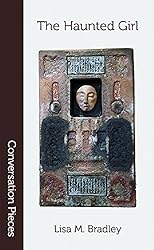
Motherland Fatherland Homelandsexuals by Patricia Lockwood (Penguin, May) — “Colloquial and incantatory, the poems in Patricia Lockwood’s second collection address the most urgent questions of our time, like: what if a deer did porn? Is America going down on Canada? What happens when Niagara Falls gets drunk at a wedding? Is it legal to marry a stuffed owl exhibit? What would Walt Whitman’s tit-pics look like? Why isn’t anyone named Gary anymore? Did the Hatfield and McCoy babies ever fall in love? The steep tilt of Lockwood’s lines sends the reader snowballing downhill, accumulating pieces of the scenery with every turn. The poems’ subject is the natural world, but their images would never occur in nature. This book is serious and funny at the same time, like a big grave with a clown lying in it.”
Citizen: An American Lyric by Claudia Rankine (Graywolf Press, October) — Via Roxanne Gay, NPR, on and on, finalist for the National Book Award, … “Claudia Rankine’s bold new book recounts mounting racial aggressions in ongoing encounters in twenty-first-century daily life and in the media. Some of these encounters are slights, seeming slips of the tongue, and some are intentional offensives in the classroom, at the supermarket, at home, on the tennis court with Serena Williams and the soccer field with Zinedine Zidane, online, on TV—everywhere, all the time. The accumulative stresses come to bear on a person’s ability to speak, perform, and stay alive. Our addressability is tied to the state of our belonging, Rankine argues, as are our assumptions and expectations of citizenship. In essay, image, and poetry, Citizen is a powerful testament to the individual and collective effects of racism in our contemporary, often named “post-race” society.”
The Haunted Girl by Lisa Bradley (Aqueduct Press, September) — “The supernatural, the animal, and the deadly often find each other in Lisa M. Bradley’s landscapes, tame or wild. Vampires, either restless or filled with ennui; shape-shifters and skin-walkers; demigoddesses of evil and lust; haunted girls and dying fairies—the characters in this collection inhabit worlds of danger, decay, and, sometimes, rebirth. Often rooted in issues of family, ritual, and belonging, the poems and short stories in The Haunted Girl display Bradley’s loving mastery of language, which grants us myriad moments of impish wit and startling beauty.”
Prelude to Bruise by Saeed Jones (Coffee House Press, August) — “This is a glittering collection of poems that move across the page with the fierce grace of a corseted dancer. Saeed Jones’ sharp rhythms and powerful images are choreographed to perfection, telling the story of Boy, a queer African-American growing up in the South, and his experiences with family, gender and desire. Smoke, booze, music and sex are all stitched together into a fabulously controlled performance.” —Amal El-Mohtar, book critic for NPR
The Memory of Planets by Ryan W. Bradley (Artistically Declined Press, April 22) — “Ryan W. Bradley’s third full-length poetry collection finds a fresh combination of muses from his first two. Whether about love or concussions, his poems arrive with confidence, taking everyday moments and spinning them for the reader to experience from a unique vantage point.”
Heteronomy by Chris Nealon (Edge Books, September) — via Ben Lerner for The Millions, who said it “has been supporting me all fall. Nealon taps into the energies of popular culture without condescension or self-congratulation or (easy) irony; his poems are at once totally well-wrought and unaffectedly conversational; he is clear-eyed about the catastrophe of the present but refuses to descend into mere melancholy; he has no illusions about poetry’s practical power but he is not in love with — or particularly tortured by — its marginality; Nealon — an accomplished literary critic — neither disavows his learning or retreats into it. Please read this book with me because everybody who reads it gets to enter a meadow where we can dance and die together.”
Bone River by Benjamin Lowenkron (Ampersand Books, January 2014) — “Sundown. Bone River. A hatchet and a cassock. Where do we go when the spirit leaves us in the moonlight at the crossroads? How many steps before we realize that we cannot escape them, that we will carry the crossroads with us forever? When the waters rise and breach the levee; when the sun fills the land with blood; when your dreams are baptized in the current; when the chorus on the far bank sings out your name; when everything around you rises from the grave, Bone River will take us, as Bone River does.” A soundtrack to the book is in the works as well.
Ghost Box by Emerson Whitney (Timeless, Infinite Light) — via Mairead Case for Vol. 1 Brooklyn: “Humans are lucky that Emerson Whitney finished his first book of poems and that Oakland-based Timeless, Infinite Light (see also: emji spero’s Almost Any Shit Will Do) published it so we can read it. The main characters are Whitney himself, Emily-who-might-be-a-ghost, and an abandoned Home Depot parking-lot-cum-bird-sanctuary in downtown Los Angeles. Everything is shifting, some of it might be dying.”
Gephyromania by TC Tolbert (Ahsahta Press) — another via Case: “Gephyromania, its name rooted in the Latin for bridge, is a very important hot-orange book of poems about gender and the body and love, using words evolving and ornamented, read both hot-dog and hamburger-style. I’ve always loved some of these poems individually but fell hard for the whole once I heard Tolbert read “The Palinode” after an incredibly generous, funny, smart conversation at the University of Denver this fall.”
The Feel Trio by Fred Moten (Letter Machine Editions) — one more! via Case: I return to this book once a week, to read or re-read a poem and learn something new from it. As CM Burroughs wrote in Lana Turner Journal on the day Maya Angelou died, “Moten’s verse references the lived and the living right now… the stakes being matters personal and political (and the political become the personal).” These poems witness, feel, clang harmony, and are sometimes very funny too. “how do we read this?” writes Moten. “this is what it’s for. To claim catastrophe.””
APPENDICES
More from PopMatters Best of 2014: Elyse Friedman's The Answer to Everything; Thomas Kyro's The Beggar and the Hare; Saadan Hassan Manto's Bombay Stories; David Grossman’s Falling Out of Time; Jon Fosse's Melancholy II; and John Warner's Tough Day for the Army: StoriesMore from SciFiChick’s Best of 2014: Witches In Red by Barb Hendee and Abracadaver by Laura Resnick
More from Roxanne Gay for The Toast: Man vs Nature by Diane Cook; Scarecrone by Melissa Broder; Bedrock Faith by Eric Charles May; Quesadillas by Juan Pablo Villalobos; Man Alive by Thomas Page McBee; Once I Was Cool by Megan Stielstra; and The Winter Lord by Jaye Edgerton
More from The Spark: Brian Hart’s The Bully of Order; Tom Williams’ Don’t Start Me Talkin’; Courtney Moreno’s In Case of Emergency; Aaron Burch’s Backswing; Kristina Marie Darling’s Fortress; Kevin Shamel’s Bigfoot Cop; Pete Fromm’s If Not for This; and Taylor Brown’s In the Season of Blood & Gold
More from Strange Horizons: Of Things Gone Astray by Janina Matthewson; Kirsty Logan’s The Rental Heart and Other Fairytales; Tom Pollock’s Our Lady of the Streets; Ghalib Islam’s Fire in the Unnameable Country; Stephanie Feldman’s The Angel of Losses; Zen Cho’s Spirits Abroad; Greg Bechtel’s Boundary Problems; and Megan Milks’s Kill Marguerite and Other Stories
More from Salon.com’s Authors’ favorite books: Mount Terminus by David Grand; Of Sea and Cloud by Jon Keller; Piano Stories by Felisberto Hernandez; The Coming Swarm: DDOS Actions, Hacktivism, and Civil Disobedience on the Internet by Molly Sauter; and In the Course of Human Events by Mike Harvkey
More from Slate.com: The Brunist Day of Wrath by Robert Coover; Black Dance by Nancy Huston; The Empathy Exams by Leslie Jamison; Poking a Dead Frog: Conversations with Today’s Top Comedy Writers by Mike Sacks; and The Witch and Other Tales Retold by Jean Thompson
More from Publishers Weekly: Highfell Grimoires by Langley Hyde; Coldbrook by Tim Lebbon; and Our Lady of the Nile by Scholastique Mukasonga, trans. from the French by Melanie Mauthner
More noir from the LA Review of Books: The Death Instinct by Jacques Mesrine (Tam Tam); Brainquake by Samuel Fuller (Hard Case Crime); Of Cops and Robbers by Mike Nicol (Old Street); The Mad and the Bad by Jean-Patrick Manchette (NYRB Classics); Futures by John Barker (PM Press); Third Rail by Rory Flynn (Houghton Mifflin Harcourt); and The Whitehall Mandarin by Edward Wilson (Arcadia Books)
More via Mairead Case for Vol. 1 Brooklyn: Mothernism by Lise Haller Baggesen (Green Lantern Press/Poor Farm Press); The Corpse Washer by Sinan Antoon, translated by Sinan Antoon (Yale University Press); You Animal Machine (The Golden Greek) by Eleni Sikelianos (Coffee House Press); Teresa, My Love by Julia Kristeva (Columbia University Press); Drift by Caroline Bergvall (Nightboat Books); New Organism: Essais by Andrea Rexilius (Letter Machine Editions)
More via Scalzi’s Big Idea: Guardian (A Veiled Worlds Novel) by Jo Anderton (FableCroft, June); Watt O’Hugh Underground by Steven S. Drachman
More via Paul Kincaid: Nest of Worlds by Marek S. Huberath and [[there]] by Lance Olsen
Among the many other lists consulted: SF Gate; SF Signal; Wall Street Journal; Kobo Books; LitReactor Part I and Part II; the NY Times; TIME; NPR; Gawker; The Millions; Tor.com; and Jeff VanderMeer’s Best of 2014 Lists Galore
